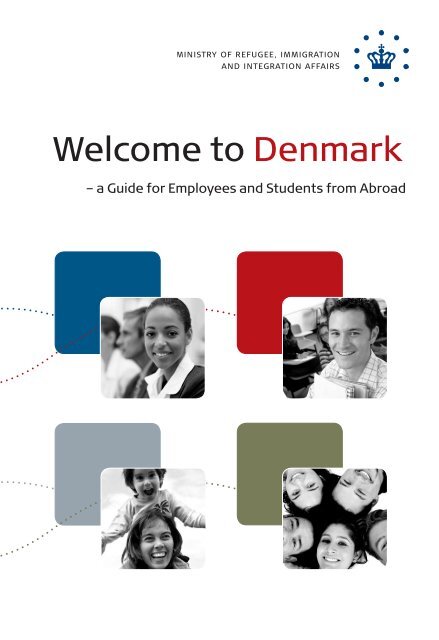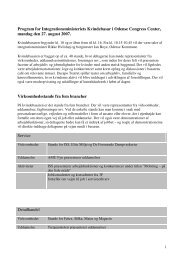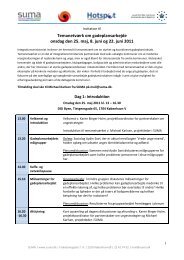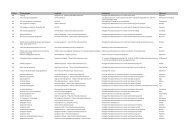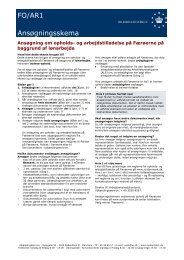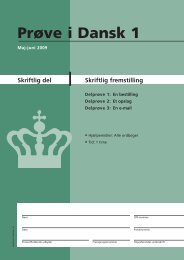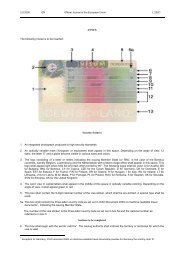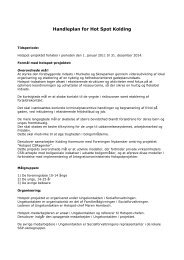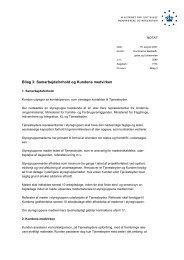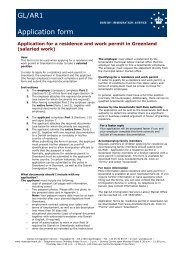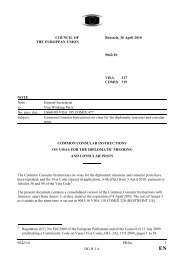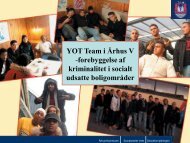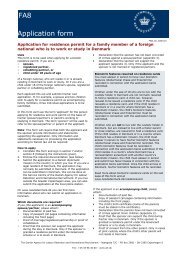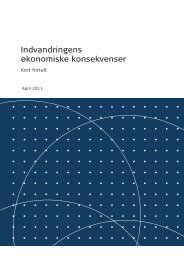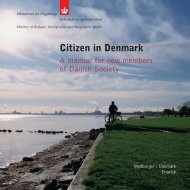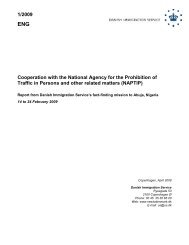Welcome to Denmark – a Guide for Employees and - Nyidanmark.dk
Welcome to Denmark – a Guide for Employees and - Nyidanmark.dk
Welcome to Denmark – a Guide for Employees and - Nyidanmark.dk
Create successful ePaper yourself
Turn your PDF publications into a flip-book with our unique Google optimized e-Paper software.
<strong>Welcome</strong> <strong>to</strong> <strong>Denmark</strong><br />
<strong>–</strong> a <strong>Guide</strong> <strong>for</strong> <strong>Employees</strong> <strong>and</strong> Students from Abroad
<strong>Welcome</strong> <strong>to</strong> <strong>Denmark</strong><br />
<strong>–</strong> a <strong>Guide</strong> <strong>for</strong> <strong>Employees</strong> <strong>and</strong> Students from Abroad
Title: <strong>Welcome</strong> <strong>to</strong> <strong>Denmark</strong> <strong>–</strong> a <strong>Guide</strong> <strong>for</strong> <strong>Employees</strong> <strong>and</strong> Students from Abroad<br />
Published by: Ministry of Refugee, Immigration <strong>and</strong> Integration Affairs<br />
Holbergsgade 6<br />
1057 Copenhagen K<br />
Telephone: 33 92 33 80<br />
Fax: 33 11 12 39<br />
E-mail: inm@inm.<strong>dk</strong><br />
ISBN, printed edition: 978-87-92701-14-5<br />
ISBN, electronic edition: 978-87-92701-15-2<br />
Copies: 12,000<br />
Graphic design <strong>and</strong> layout: Linda Balle<br />
Printers: GP-Tryk A/S<br />
Printed: February 2011<br />
Pho<strong>to</strong>s: Sc<strong>and</strong>inavian S<strong>to</strong>ckPho<strong>to</strong>: page 12 pho<strong>to</strong> by Jacob Wacherhausen,<br />
pages 7, 22 <strong>and</strong> 36 pho<strong>to</strong>s by Andres Rodriguez<br />
The final version was closed on the 1st of February 2011.<br />
An updated version can be found at: www.new<strong>to</strong>denmark.<strong>dk</strong> .
<strong>Welcome</strong> <strong>to</strong> <strong>Denmark</strong><br />
IN DENMARK WE WANT To WELCoME NEW CITIzENS WHo ARE<br />
INTERESTED IN WoRKING oR STuDyING IN THE CouNTRy.<br />
For this reason the Danish Ministry of Integration has prepared this guide<br />
in cooperation with other Danish ministries. The guide provides answers as<br />
<strong>to</strong> how you <strong>–</strong> <strong>and</strong> your family, where applicable <strong>–</strong> can come <strong>to</strong> <strong>Denmark</strong> <strong>to</strong><br />
work or study. It also provides sound practical advice on how <strong>to</strong> begin your<br />
new life in <strong>Denmark</strong>.<br />
The guide begins with an introduction. The introduction directs you <strong>to</strong> the<br />
guide’s 20 in<strong>for</strong>mation pages, which will provide you with all the specific<br />
in<strong>for</strong>mation you need.<br />
The introduction is divided in<strong>to</strong> the following thematic sections:<br />
How <strong>to</strong> come <strong>to</strong> <strong>Denmark</strong> <strong>to</strong> work<br />
How <strong>to</strong> come <strong>to</strong> <strong>Denmark</strong> <strong>to</strong> study<br />
How <strong>to</strong> bring your family <strong>to</strong> <strong>Denmark</strong><br />
What <strong>to</strong> do when you move <strong>to</strong> <strong>Denmark</strong><br />
At the end of the introduction you will find a list of the 20 in<strong>for</strong>mation<br />
pages included in the guide.<br />
At the back of the guide you will find links providing additional<br />
in<strong>for</strong>mation in English.
How <strong>to</strong> come <strong>to</strong> <strong>Denmark</strong> <strong>to</strong> work<br />
Be<strong>for</strong>e moving <strong>to</strong> <strong>Denmark</strong> <strong>to</strong> work, you are normally required <strong>to</strong> have a<br />
residence <strong>and</strong> work permit. In many cases, it is a prerequisite that you have<br />
already found employment in the country. However, if you are an EU/EEA<br />
citizen or a Swiss national (subsequently referred <strong>to</strong> as an EU citizen) <strong>and</strong><br />
are expecting <strong>to</strong> reside in <strong>Denmark</strong> <strong>for</strong> more than three months, you must<br />
apply <strong>for</strong> a registration certificate.<br />
On the blue in<strong>for</strong>mation pages you will find practical in<strong>for</strong>mation<br />
about how <strong>to</strong> come <strong>to</strong> <strong>Denmark</strong> <strong>to</strong> work.<br />
Finding work in <strong>Denmark</strong> from abroad<br />
1<br />
• If you reside in another country <strong>and</strong> want <strong>to</strong> seek<br />
employment in <strong>Denmark</strong>, please read in<strong>for</strong>mation page 1.<br />
Entry regulation <strong>for</strong> specific groups<br />
2<br />
3<br />
4<br />
• If you are an EU citizen <strong>and</strong> want <strong>to</strong> work in <strong>Denmark</strong>, please<br />
read in<strong>for</strong>mation page 2.<br />
• If you are not an EU citizen <strong>and</strong> have been offered employment<br />
in <strong>Denmark</strong>, please read in<strong>for</strong>mation page 3.<br />
• If you are not an EU citizen <strong>and</strong> want <strong>to</strong> seek employment in<br />
<strong>Denmark</strong>, please read in<strong>for</strong>mation page 4.<br />
If you are a Nordic citizen, you are free <strong>to</strong> enter, live, study <strong>and</strong> work<br />
in <strong>Denmark</strong>.<br />
You can find an overview of EU/EEA countries <strong>and</strong> the Nordic countries<br />
at: www.new<strong>to</strong>denmark.<strong>dk</strong>/eu. Please note that citizens from<br />
Switzerl<strong>and</strong> are covered by the same rules as citizens from EU/EEA<br />
countries.
How <strong>to</strong> come <strong>to</strong> <strong>Denmark</strong> <strong>to</strong> study<br />
In many cases, be<strong>for</strong>e moving <strong>to</strong> <strong>Denmark</strong> <strong>to</strong> study, you will require a<br />
residence permit. To qualify <strong>for</strong> a residence permit you will have <strong>to</strong> be<br />
enrolled in a course of study. However, if you are an EU/EEA citizen or a<br />
Swiss national (subsequently referred <strong>to</strong> as an EU citizen) <strong>and</strong> are expecting<br />
<strong>to</strong> reside in <strong>Denmark</strong> <strong>for</strong> more than three months, you must apply <strong>for</strong> a<br />
registration certificate.<br />
On the red in<strong>for</strong>mation pages you will find further in<strong>for</strong>mation about<br />
how <strong>to</strong> come <strong>to</strong> <strong>Denmark</strong> <strong>to</strong> study.<br />
Enrolling in a programme of higher education<br />
in English in <strong>Denmark</strong><br />
5<br />
• If you want <strong>to</strong> take a programme of higher education in<br />
English in <strong>Denmark</strong>, please read in<strong>for</strong>mation page 5.<br />
Entry regulation <strong>for</strong> specific groups<br />
6<br />
7<br />
• If you are an EU citizen <strong>and</strong> want <strong>to</strong> study in <strong>Denmark</strong>,<br />
please read in<strong>for</strong>mation page 6.<br />
• If you are not an EU citizen <strong>and</strong> want <strong>to</strong> study in <strong>Denmark</strong>,<br />
please read in<strong>for</strong>mation page 7.<br />
If you are a Nordic citizen, you are free <strong>to</strong> enter, live, study <strong>and</strong> work<br />
in <strong>Denmark</strong>.<br />
You can find an overview of EU/EEA countries <strong>and</strong> the Nordic countries<br />
at: www.new<strong>to</strong>denmark.<strong>dk</strong>/eu. Please note that citizens from<br />
Switzerl<strong>and</strong> are covered by the same rules as citizens from EU/EEA<br />
countries.
How <strong>to</strong> bring your family <strong>to</strong><br />
<strong>Denmark</strong><br />
You can bring your family with you <strong>to</strong> <strong>Denmark</strong> if you come here <strong>to</strong> work<br />
or study as an EU/EEA citizen or a Swiss national (subsequently referred <strong>to</strong><br />
as an EU citizen). If you are not an EU citizen but have a residence permit<br />
that entitles you <strong>to</strong> work or follow a programme of higher education in<br />
<strong>Denmark</strong>, you are, as a rule, entitled <strong>to</strong> bring your family with you.<br />
On the grey in<strong>for</strong>mation pages you will find further in<strong>for</strong>mation about<br />
how <strong>to</strong> bring your family with you <strong>to</strong> <strong>Denmark</strong>:<br />
8<br />
9<br />
• If you are an EU citizen, please read in<strong>for</strong>mation page 8.<br />
• If you are not an EU citizen, please read in<strong>for</strong>mation page 9.<br />
If your family are Nordic citizens, they are free <strong>to</strong> enter, live, study <strong>and</strong><br />
work in <strong>Denmark</strong>.<br />
Please note: From 1 January 2011 onwards, a processing fee will<br />
normally need <strong>to</strong> be paid when a <strong>for</strong>eign national applies <strong>for</strong> a<br />
residence permit, an extension of a residence permit <strong>and</strong> <strong>for</strong> a<br />
permanent residence permit in the areas of work, studies <strong>and</strong> family<br />
reunification. Read more about it at: www.new<strong>to</strong>denmark.<strong>dk</strong>/fee.<br />
You can find an overview of EU/EEA countries <strong>and</strong> the Nordic countries<br />
at: www.new<strong>to</strong>denmark.<strong>dk</strong>/eu. Please note that citizens from<br />
Switzerl<strong>and</strong> are covered by the same rules as citizens from EU/EEA<br />
countries.
What <strong>to</strong> do when you move<br />
<strong>to</strong> <strong>Denmark</strong><br />
On the green in<strong>for</strong>mation pages you will find in<strong>for</strong>mation about what<br />
<strong>to</strong> do when you move <strong>to</strong> <strong>Denmark</strong>. Remember, <strong>to</strong>o, that in many cases you<br />
will need a residence permit or need <strong>to</strong> apply <strong>for</strong> a registration certificate.<br />
(You can read more about this in the previous sections).<br />
10<br />
11<br />
12<br />
13<br />
14<br />
General issues<br />
• Be<strong>for</strong>e moving <strong>to</strong> <strong>Denmark</strong>, it is a distinct advantage <strong>to</strong> have<br />
found somewhere <strong>to</strong> live. If you are going <strong>to</strong> work in<br />
<strong>Denmark</strong>, you can ask your employer <strong>for</strong> help. If you are a<br />
student, your place of study may be able <strong>to</strong> help you. You<br />
can read more about this on in<strong>for</strong>mation page 10.<br />
• As a rule, you must report your immigration <strong>to</strong> the Citizen<br />
Service Centre in your local municipality, if you are going<br />
<strong>to</strong> stay in <strong>Denmark</strong> <strong>for</strong> more than three months<br />
(six months <strong>for</strong> some groups), have a legal basis <strong>for</strong> residing<br />
in the country <strong>and</strong> a residence, or a fixed place of abode.<br />
You can read more about this on in<strong>for</strong>mation pages 11 <strong>and</strong> 12.<br />
• When you have reported your immigration <strong>and</strong> have<br />
registered with the CPR, you are free <strong>to</strong> choose a general<br />
practitioner (GP). Your local municipality will then send you<br />
a health insurance card that gives you access <strong>to</strong> the Danish<br />
public healthcare system. You can read more about this on<br />
in<strong>for</strong>mation page 13.<br />
• As a rule, you are required <strong>to</strong> pay tax on your earnings in<br />
<strong>Denmark</strong>, regardless of whether you have registered<br />
with the CPR. You can read more about this on in<strong>for</strong>mation<br />
page 14.
15<br />
16<br />
17<br />
18<br />
19<br />
20<br />
If you have children<br />
• If you have children aged between 0 <strong>and</strong> 6, you can have<br />
them looked after, e.g. in a kindergarten or in family day<br />
care. Children aged 6-10 can be looked after in an aftercare<br />
centre when the child is free from school. You can read more<br />
about this on in<strong>for</strong>mation page 15.<br />
• If you have children aged between 6 <strong>and</strong> 16, you can enrol<br />
your children at school. You can read more about this on<br />
in<strong>for</strong>mation page 16.<br />
If you want <strong>to</strong> learn Danish<br />
• As a rule, if you have turned 18, you are entitled <strong>to</strong> three<br />
years’ Danish tuition. You can read more about this on<br />
in<strong>for</strong>mation page 17.<br />
If you want <strong>to</strong> look <strong>for</strong> employment<br />
• If you want <strong>to</strong> look <strong>for</strong> employment in <strong>Denmark</strong> once you<br />
have moved <strong>to</strong> the country, please read in<strong>for</strong>mation page 18.<br />
If you want <strong>to</strong> drive<br />
• You may drive a car in <strong>Denmark</strong> if you hold a valid driving<br />
licence issued by an EU/EEA country or the Faroe Isl<strong>and</strong>s.<br />
Driving licences from other countries may be used <strong>for</strong> up <strong>to</strong><br />
90 days from taking up residence in <strong>Denmark</strong>. If, after this<br />
time, you want <strong>to</strong> drive a car in <strong>Denmark</strong>, you will have <strong>to</strong><br />
apply <strong>for</strong> a Danish driving licence. You can read more about<br />
this on in<strong>for</strong>mation page 19.<br />
If you want <strong>to</strong> take part in cultural <strong>and</strong> leisure activities<br />
• <strong>Denmark</strong> has a rich cultural life <strong>and</strong> a wide range of leisure<br />
activities in which you can take part. You can read more<br />
about this on in<strong>for</strong>mation page 20.
INFoRMATIoN PAGES<br />
Be<strong>for</strong>e you move <strong>to</strong> <strong>Denmark</strong><br />
1. Finding work in <strong>Denmark</strong> from abroad<br />
2. How <strong>to</strong> come <strong>to</strong> <strong>Denmark</strong> <strong>to</strong> work (Eu citizens)<br />
3. How <strong>to</strong> come <strong>to</strong> <strong>Denmark</strong> <strong>to</strong> work (non-Eu citizens)<br />
4. How <strong>to</strong> come <strong>to</strong> <strong>Denmark</strong> <strong>to</strong> work under the<br />
greencard scheme (non-Eu citizens)<br />
5. Enrolling in a programme of higher education in English in <strong>Denmark</strong><br />
6. How <strong>to</strong> come <strong>to</strong> <strong>Denmark</strong> <strong>to</strong> study (Eu citizens)<br />
7. How <strong>to</strong> come <strong>to</strong> <strong>Denmark</strong> <strong>to</strong> study (non-Eu citizens)<br />
8. How <strong>to</strong> bring your family <strong>to</strong> <strong>Denmark</strong> (Eu citizens)<br />
9. How <strong>to</strong> bring your family <strong>to</strong> <strong>Denmark</strong> (non-Eu citizens)<br />
When you move <strong>to</strong> <strong>Denmark</strong><br />
10. Accommodation<br />
11. Citizen Service Centre<br />
12. The Civil Registration System (CPR)<br />
13. Health<br />
14. Tax<br />
15. Child day care services<br />
16. School<br />
17. Danish tuition<br />
18. Job seeking<br />
19. Transport<br />
20. Cultural life <strong>and</strong> leisure activities
WoRK<br />
STuDy<br />
FAMILy<br />
MovE
WoRK
CoNTENTS<br />
Finding work in <strong>Denmark</strong> from abroad<br />
1. Finding work in <strong>Denmark</strong> from abroad<br />
Entry regulation <strong>for</strong> specific groups<br />
2. How <strong>to</strong> come <strong>to</strong> <strong>Denmark</strong> <strong>to</strong> work (Eu citizens)<br />
3. How <strong>to</strong> come <strong>to</strong> <strong>Denmark</strong> <strong>to</strong> work (non-Eu citizens)<br />
4. How <strong>to</strong> come <strong>to</strong> <strong>Denmark</strong> <strong>to</strong> work under the<br />
greencard scheme (non-Eu citizens)<br />
WoRK
1<br />
Finding work in <strong>Denmark</strong><br />
from abroad<br />
Brief introduction<br />
There are different ways <strong>to</strong> find work in <strong>Denmark</strong> when you live in<br />
another country. One way is <strong>to</strong> log on<strong>to</strong> www.workindenmark.<strong>dk</strong>. Here<br />
you will find a job bank with international job advertisements <strong>and</strong> a CV<br />
database where you can register your CV.<br />
You can also contact one of the three regional workindenmark<br />
centres in <strong>Denmark</strong>. You can find additional in<strong>for</strong>mation at:<br />
www.workindenmark.<strong>dk</strong>.<br />
How do I find work in <strong>Denmark</strong> when I live in another country?<br />
You can, <strong>for</strong> example, find work in <strong>Denmark</strong> by:<br />
• Checking online <strong>for</strong> job advertisements, <strong>for</strong> example at:<br />
www.workindenmark.<strong>dk</strong>.<br />
• Registering your CV with an online CV database, e.g. at:<br />
www.workindenmark.<strong>dk</strong>.<br />
• Applying <strong>for</strong> a job through recruitment or temporary employment<br />
agencies.<br />
• Sending an unsolicited job application or by approaching the workplace<br />
in person.<br />
• Using your personal contacts with others who are already working in<br />
<strong>Denmark</strong>.<br />
To get a job in <strong>Denmark</strong> you will have <strong>to</strong> possess the necessary skills <strong>and</strong><br />
qualifications that fit the job opportunities on offer. The vast majority of<br />
jobs require that you have special skills or are willing <strong>to</strong> acquire new ones.
Most employers will ask <strong>for</strong> a written job application. For job seeking in<br />
<strong>Denmark</strong>, a job application should be roughly one page long. In it you<br />
should state your reasons <strong>for</strong> applying <strong>for</strong> the job, your qualifications <strong>and</strong><br />
experience <strong>and</strong> write a little about yourself. It is a good idea <strong>to</strong> enclose a<br />
copy of your CV, listing your education <strong>and</strong> job experience. Similarly, it is<br />
advisable <strong>to</strong> enclose copies of examination certificates <strong>and</strong> references from<br />
previous employers <strong>and</strong> internships.<br />
How are working conditions in <strong>Denmark</strong>?<br />
You can find in<strong>for</strong>mation about working conditions <strong>–</strong> including workers’<br />
rights <strong>–</strong> in <strong>Denmark</strong> at: www.workindenmark.<strong>dk</strong>.<br />
Where should I inquire?<br />
You can contact one of the three regional workindenmark centres in<br />
<strong>Denmark</strong>. You can find in<strong>for</strong>mation at: www.workindenmark.<strong>dk</strong>.<br />
Where can I find additional in<strong>for</strong>mation?<br />
You can find additional in<strong>for</strong>mation on the following websites:<br />
• www.workindenmark.<strong>dk</strong>: <strong>Denmark</strong>’s official website <strong>for</strong> international<br />
recruitment <strong>and</strong> job seekers <strong>and</strong> in<strong>for</strong>mation on living <strong>and</strong> working<br />
conditions in <strong>Denmark</strong>. Here you will also find job advertisements <strong>and</strong> a<br />
CV database <strong>for</strong> employees <strong>and</strong> students from abroad.<br />
• www.new<strong>to</strong>denmark.<strong>dk</strong>/in<strong>for</strong>mationguide: In<strong>for</strong>mation guide <strong>for</strong><br />
people moving <strong>to</strong> <strong>Denmark</strong>.<br />
• www.seasonalwork.<strong>dk</strong>: <strong>Denmark</strong>’s official website <strong>for</strong> seasonal work.<br />
• www.jobnet.<strong>dk</strong>: <strong>Denmark</strong>’s largest job portal, which includes the<br />
municipal job centres’ job offers <strong>for</strong> all job seekers <strong>and</strong> employers<br />
throughout the country. Here you can find the address of the municipal<br />
Job Centre. This website is in Danish.<br />
WoRK<br />
1
INFoRMATIoN FoR Eu CITIzENS<br />
2<br />
How <strong>to</strong> come <strong>to</strong> <strong>Denmark</strong> <strong>to</strong> work<br />
Brief introduction<br />
As an EU, EEA or Swiss national you are free <strong>to</strong> enter <strong>Denmark</strong>.<br />
No prior residence permit or visa is required <strong>to</strong> work in <strong>Denmark</strong>.<br />
However, if your stay in <strong>Denmark</strong> is expected <strong>to</strong> exceed three months,<br />
you must apply <strong>for</strong> a registration certificate. Jobseekers are required<br />
<strong>to</strong> submit their application within six months after entry.<br />
You can find additional in<strong>for</strong>mation about residence in <strong>Denmark</strong> under<br />
EU rules at: www.new<strong>to</strong>denmark.<strong>dk</strong>/eu.<br />
How can I gain access <strong>to</strong> working in <strong>Denmark</strong> under EU rules<br />
regarding free movement of workers?<br />
As an EU, EEA or Swiss national you are free <strong>to</strong> enter <strong>Denmark</strong>. You can<br />
stay in the country while you are seeking employment or you can enter<br />
the country <strong>and</strong> begin working if you have found employment. No prior<br />
residence permit or visa is required.<br />
Job seeking period<br />
You are free <strong>to</strong> enter <strong>Denmark</strong> <strong>and</strong> stay in the country <strong>for</strong> three months.<br />
If you want <strong>to</strong> stay in <strong>Denmark</strong> while you are seeking employment, you can<br />
stay in the country <strong>for</strong> six months. The only requirement is that you can<br />
support yourself during the job seeking period. A registration certificate is<br />
not required <strong>for</strong> job seekers in <strong>Denmark</strong> who reside in the country <strong>for</strong> up <strong>to</strong><br />
six months.<br />
When you have found employment in <strong>Denmark</strong><br />
When you have found a job in <strong>Denmark</strong>, you can start working when it suits<br />
you <strong>and</strong> your employer. No prior residence permit is required.
Registration certificate<br />
If your stay in <strong>Denmark</strong> as an employee is expected <strong>to</strong> exceed three<br />
months, you must apply <strong>for</strong> a registration certificate. The registration<br />
certificate is your documentation that you are entitled <strong>to</strong> stay <strong>and</strong> work in<br />
<strong>Denmark</strong> under EU rules on free movement of workers. It is also the key <strong>to</strong><br />
the rest of your contact with the Danish authorities. You should there<strong>for</strong>e<br />
begin by applying <strong>for</strong> your registration certificate.<br />
Where should I inquire?<br />
You can apply <strong>for</strong> a registration certificate in person at the Regional State<br />
Administration in the region in which you reside.<br />
You can find your Regional State Administration at:<br />
www.stats<strong>for</strong>valtning.<strong>dk</strong>.<br />
The website will provide you with an application <strong>for</strong>m which must be<br />
completed <strong>and</strong> h<strong>and</strong>ed in <strong>to</strong>gether with a passport pho<strong>to</strong> <strong>and</strong> proof of<br />
employment in <strong>Denmark</strong>. Furthermore you will be required <strong>to</strong> present your<br />
passport or national identity card.<br />
Where can I find additional in<strong>for</strong>mation?<br />
You can find additional in<strong>for</strong>mation about residence in <strong>Denmark</strong> under EU<br />
rules at: www.new<strong>to</strong>denmark.<strong>dk</strong>/eu.<br />
WoRK<br />
2
INFoRMATIoN FoR NoN-Eu CITIzENS<br />
3 How <strong>to</strong> come <strong>to</strong> <strong>Denmark</strong> <strong>to</strong> work<br />
Brief introduction<br />
You can apply <strong>for</strong> a residence <strong>and</strong> work permit in <strong>Denmark</strong>. As a rule,<br />
this requires that you possess special qualifications <strong>and</strong> that you have<br />
been offered employment at st<strong>and</strong>ard terms of pay <strong>and</strong> conditions of<br />
employment. You must apply <strong>for</strong> a residence <strong>and</strong> work permit at the<br />
Danish embassy or consulate in your home country.<br />
There are several schemes that can help highly qualified <strong>for</strong>eigners get<br />
a residence <strong>and</strong> work permit in <strong>Denmark</strong>.<br />
You can find additional in<strong>for</strong>mation about applying <strong>for</strong> a residence <strong>and</strong><br />
work permit in <strong>Denmark</strong> at: www.new<strong>to</strong>denmark.<strong>dk</strong>/work.<br />
How can I gain access <strong>to</strong> work in <strong>Denmark</strong>?<br />
Residence <strong>and</strong> work permits<br />
In order <strong>to</strong> work in <strong>Denmark</strong> you must have a residence <strong>and</strong> work permit.<br />
As a rule, a residence <strong>and</strong> work permit requires that you possess special<br />
qualifications <strong>and</strong> that you have been offered employment at st<strong>and</strong>ard<br />
terms of pay <strong>and</strong> conditions of employment.<br />
If you are offered employment in <strong>Denmark</strong>, it is your responsibility <strong>to</strong> get a<br />
residence <strong>and</strong> work permit. If you work illegally in <strong>Denmark</strong>, you risk deportation<br />
<strong>and</strong> you <strong>and</strong> your employer risk a fine, or in particularly serious cases,<br />
imprisonment.<br />
Special schemes<br />
There are several schemes that can help highly qualified <strong>for</strong>eigners apply<br />
<strong>for</strong> a residence <strong>and</strong> work permit in <strong>Denmark</strong>:<br />
• The Positive List <strong>–</strong> is a list of professions where there is a shortage of<br />
qualified labour. If you are trained in one of these professions, you will<br />
have particularly easy access <strong>to</strong> the Danish labour market.<br />
View the entire list here: www.new<strong>to</strong>denmark.<strong>dk</strong>/positivelist.
• The Pay Limit scheme <strong>–</strong> means that you have particularly easy access <strong>to</strong><br />
the Danish labour market if you have been offered a job with a gross<br />
annual pay of more than DKK 375,000.<br />
• The Corporate scheme <strong>–</strong> means that as an employee working <strong>for</strong> an<br />
overseas company with operations in <strong>Denmark</strong>, you can apply <strong>for</strong> a cor-<br />
porate residence permit <strong>for</strong> a fixed period so you can alternate between<br />
working in <strong>Denmark</strong> <strong>and</strong> abroad.<br />
• The greencard scheme <strong>–</strong> enables highly qualified professionals <strong>to</strong> come<br />
<strong>to</strong> <strong>Denmark</strong> <strong>to</strong> seek employment <strong>and</strong> subsequently work in the country.<br />
You can find out more about the scheme on in<strong>for</strong>mation page 4.<br />
• Researchers <strong>–</strong> as a researcher you have particularly easy access <strong>to</strong> the<br />
Danish labour market.<br />
• Self-employed persons <strong>–</strong> as a self-employed person you may, under<br />
certain circumstances, be eligible <strong>to</strong> operate an independent business<br />
in <strong>Denmark</strong>.<br />
• Special groups of <strong>for</strong>eigners are exempt from the normal regulations.<br />
Such groups include diplomats, certain musicians <strong>and</strong> entertainers, people<br />
employed in the transportation sec<strong>to</strong>r <strong>and</strong> certain Turkish nationals.<br />
Where should I inquire?<br />
You must apply <strong>for</strong> a residence <strong>and</strong> work permit at the Danish embassy or<br />
consulate in your home country. If you are legally residing in <strong>Denmark</strong>, you<br />
can send an application <strong>to</strong> the Danish Immigration Service or your local<br />
police station.<br />
Where can I find additional in<strong>for</strong>mation?<br />
You can find additional in<strong>for</strong>mation on the following websites:<br />
• www.new<strong>to</strong>denmark.<strong>dk</strong>/work: Here you can find in<strong>for</strong>mation about<br />
applying <strong>for</strong> a residence <strong>and</strong> work permit in <strong>Denmark</strong>. You can also find<br />
the application <strong>for</strong>m you will need.<br />
• www.um.<strong>dk</strong>: Here you will find the Ministry of Foreign Affairs in<br />
<strong>Denmark</strong>’s list of Danish embassies <strong>and</strong> consulates abroad.<br />
• www.workindenmark.<strong>dk</strong>: <strong>Denmark</strong>’s official website <strong>for</strong> international<br />
recruitment <strong>and</strong> job seekers.<br />
• www.investindenmark.<strong>dk</strong>: Useful website if you are considering starting<br />
your own business or establishing a branch of an existing company.<br />
WoRK<br />
3
INFoRMATIoN FoR NoN-Eu CITIzENS<br />
4<br />
How <strong>to</strong> come <strong>to</strong> <strong>Denmark</strong> <strong>to</strong> work<br />
under the greencard scheme<br />
Brief introduction<br />
If you want <strong>to</strong> come <strong>to</strong> <strong>Denmark</strong> <strong>for</strong> the purpose of seeking employment,<br />
you can apply <strong>for</strong> a residence permit under the greencard scheme.<br />
The greencard scheme enables you <strong>to</strong> have a residence permit without<br />
a specific job offer. A green card is issued following an individual<br />
assessment on the basis of a point system.<br />
You can find additional in<strong>for</strong>mation about applying <strong>for</strong> a residence per-<br />
under the greencard scheme at: www.new<strong>to</strong>denmark.<strong>dk</strong>/greencard.<br />
What are the conditions <strong>for</strong> granting a residence permit under<br />
the greencard scheme?<br />
To receive a residence permit under the greencard scheme you must score<br />
a minimum of 100 points. Points are awarded according <strong>to</strong> five criteria:<br />
education, language proficiency, work experience, adaptability <strong>and</strong> age.<br />
You can read more on this below.<br />
Furthermore, it is a condition that:<br />
• You take out health insurance that covers you until you have registered<br />
with the Civil Registration System (CPR) in the Citizen Service Centre<br />
in your local municipality <strong>and</strong> are thus eligible <strong>for</strong> the services provided<br />
under the Danish Health Act.<br />
• In connection with your application, you can document that you are<br />
able <strong>to</strong> support yourself during your first year in <strong>Denmark</strong>.<br />
Educational requirements<br />
To be awarded points <strong>for</strong> your educational level you must, as a minimum,<br />
have a degree corresponding <strong>to</strong> a Danish Bachelor’s degree. You can also<br />
only be awarded points <strong>for</strong> one educational level. You may be awarded<br />
bonus points if you have graduated from a university that is internationally<br />
recognised <strong>for</strong> offering tuition of a high professional st<strong>and</strong>ard. Your educational<br />
level will be assessed <strong>and</strong> translated in<strong>to</strong> the Danish equivalent.
Language proficiency<br />
In order <strong>to</strong> be awarded points <strong>for</strong> language proficiency you must be able<br />
<strong>to</strong> document, as a minimum, that you have passed an exam in Danish,<br />
Swedish, Norwegian, English or German at a level corresponding <strong>to</strong> the<br />
Danish Language Test, Level 1. You can also document your language<br />
proficiency by providing a statement from a previous employer attesting<br />
<strong>to</strong> the fact that you have used the language in question as a working<br />
language <strong>for</strong> a minimum of one year. Alternatively, you can have completed<br />
a minimum of one year’s study of a programme of higher education which<br />
concluded with an exam in the language in question.<br />
Job experience<br />
Points can be awarded on the basis of your work experience. This will<br />
depend on the number of years within the last five years you have worked<br />
either as a researcher or in a specific field where there is a lack of<br />
particularly qualified labour (the Positive List).<br />
Adaptability<br />
Points can be awarded on the basis of your ability <strong>to</strong> adapt <strong>to</strong> the Danish<br />
labour market. Points can also be awarded <strong>for</strong> your educational or workrelated<br />
affiliation with EU/EEA (including <strong>Denmark</strong>) or Switzerl<strong>and</strong>.<br />
Age:<br />
Points can be awarded on the basis of your age at the time of application.<br />
The highest number of points is awarded <strong>for</strong> applicants under the age of 35.<br />
Where should I inquire?<br />
You must apply <strong>for</strong> a residence permit under the greencard scheme at<br />
the Danish embassy or consulate in your home country. If you are legally<br />
residing in <strong>Denmark</strong>, you can send an application <strong>to</strong> the Danish Immigration<br />
Service or your local police station.<br />
Where can I find additional in<strong>for</strong>mation?<br />
You can find additional in<strong>for</strong>mation on the following websites:<br />
• www.new<strong>to</strong>denmark.<strong>dk</strong>/greencard: Here you can find out more about<br />
the greencard scheme as well as the application <strong>for</strong>m you will need.<br />
• www.um.<strong>dk</strong>: Here you will find the Ministry of Foreign Affairs in<br />
<strong>Denmark</strong>’s list of Danish embassies <strong>and</strong> consulates abroad.<br />
WoRK<br />
4
STuDy
CoNTENTS<br />
Enrolling in a programme of higher education<br />
in English in <strong>Denmark</strong><br />
5. Enrolling in a programme of higher education<br />
in English in <strong>Denmark</strong><br />
Entry regulation <strong>for</strong> specific groups<br />
6. How <strong>to</strong> come <strong>to</strong> <strong>Denmark</strong> <strong>to</strong> study<br />
(Eu citizens)<br />
7. How <strong>to</strong> come <strong>to</strong> <strong>Denmark</strong> <strong>to</strong> study<br />
(non-Eu citizens)<br />
STuDy
5<br />
Enrolling in a programme of higher<br />
education in English in <strong>Denmark</strong><br />
Brief introduction<br />
Danish institutions of higher education offer a wide range of<br />
programmes <strong>for</strong> international students.<br />
You can select from three types of higher education institutions, each<br />
with its own unique profile. However, all offer high quality programmes<br />
at undergraduate or postgraduate level.<br />
You can find additional in<strong>for</strong>mation about programmes of higher<br />
education in English in <strong>Denmark</strong> at: www.new<strong>to</strong>denmark.<strong>dk</strong>/<br />
in<strong>for</strong>mationguide or www.studyindenmark.<strong>dk</strong>.<br />
How can I study in English in <strong>Denmark</strong>?<br />
Higher education institutions in <strong>Denmark</strong> can be divided in<strong>to</strong> three main<br />
categories:<br />
• Universities or university level institutions offering research-based<br />
undergraduate <strong>and</strong> postgraduate programmes (Bachelor’s, Master’s<br />
<strong>and</strong> PhD).<br />
• University Colleges (Professionshøjskoler) offering 3-4½ years’<br />
undergraduate programmes (Professional Bachelor’s programmes).<br />
• Academies of Professional Higher Education (Erhvervsakademier)<br />
offering 2-2½ years’ Academy Profession programmes <strong>and</strong> joint<br />
Bachelor’s programmes in cooperation with University Colleges.<br />
It is also possible <strong>to</strong> choose programmes on the basis of artistic merit at<br />
several higher education institutions, i.e. architectural colleges <strong>and</strong> music<br />
conserva<strong>to</strong>ries.
What does it cost <strong>to</strong> study in <strong>Denmark</strong>?<br />
As a rule, EU/EEA citizens are not required <strong>to</strong> pay tuition fees <strong>for</strong><br />
programmes of higher education in <strong>Denmark</strong>. The same applies <strong>to</strong> students<br />
who are enrolled in a student exchange programme or the children of<br />
employees from abroad living in <strong>Denmark</strong>. Other students are required<br />
<strong>to</strong> pay tuition fees. The annual tuition fees <strong>for</strong> full-time students range<br />
between EUR 6,000 <strong>and</strong> 16,000 (in 2011).<br />
Where should I inquire?<br />
You should contact the higher education institution at which you intend <strong>to</strong><br />
enrol. Here you will be in<strong>for</strong>med about the programme of education <strong>and</strong><br />
entry requirements.<br />
Where can I find additional in<strong>for</strong>mation?<br />
You can find additional in<strong>for</strong>mation on the following websites:<br />
• www.new<strong>to</strong>denmark.<strong>dk</strong>/in<strong>for</strong>mationguide: An in<strong>for</strong>mation guide <strong>for</strong><br />
people moving <strong>to</strong> <strong>Denmark</strong>.<br />
• www.studyindenmark.<strong>dk</strong>: <strong>Denmark</strong>’s official website <strong>for</strong> higher<br />
education programmes in English.<br />
• www.ug.<strong>dk</strong>: <strong>Denmark</strong>’s official education website, which includes<br />
programmes of higher education in English.<br />
• www.workindenmark.<strong>dk</strong>: <strong>Denmark</strong>’s official website <strong>for</strong> international<br />
recruitment <strong>and</strong> job seekers. You can find jobs <strong>for</strong> international<br />
students at: www.workindenmark.<strong>dk</strong>/Find+in<strong>for</strong>mation/Students.aspx.<br />
STuDy<br />
5
INFoRMATIoN FoR Eu CITIzENS<br />
6<br />
How <strong>to</strong> come <strong>to</strong> <strong>Denmark</strong> <strong>to</strong> study<br />
Brief introduction<br />
As an EU, EEA or Swiss national you are free <strong>to</strong> enter <strong>Denmark</strong>. You<br />
can stay in the country with a view <strong>to</strong> studying at a private or public<br />
institution approved by the Danish authorities. If your stay in <strong>Denmark</strong><br />
exceeds three months, you must apply <strong>for</strong> a registration certificate.<br />
You can find additional in<strong>for</strong>mation about staying in <strong>Denmark</strong> as a<br />
student under EU regulations at: www.new<strong>to</strong>denmark.<strong>dk</strong>/eu.<br />
What are the conditions <strong>for</strong> staying in <strong>Denmark</strong> as a student<br />
under EU regulations?<br />
As an EU/EEA citizen or a Swiss national you are free <strong>to</strong> enter <strong>and</strong> reside<br />
in <strong>Denmark</strong> <strong>for</strong> three months with a view <strong>to</strong> studying at a private or<br />
public institution approved by the Danish authorities. You are thus free<br />
<strong>to</strong> commence the programme of education <strong>for</strong> which you are enrolled in<br />
<strong>Denmark</strong>. No prior residence permit or visa is required.<br />
If you want <strong>to</strong> stay in <strong>Denmark</strong> <strong>for</strong> longer than three months with a view <strong>to</strong><br />
studying, you must apply <strong>for</strong> a registration certificate.<br />
The conditions are that you have been admitted at an educational<br />
institution in <strong>Denmark</strong> <strong>and</strong> that you also have sufficient means <strong>to</strong> finance<br />
your stay in the country.
Registration certificate<br />
If you expect <strong>to</strong> stay in <strong>Denmark</strong> <strong>for</strong> longer than three months, you must<br />
apply <strong>for</strong> a registration certificate. The registration certificate is your<br />
documentation that you are entitled <strong>to</strong> stay <strong>and</strong> study in <strong>Denmark</strong> under<br />
EU rules on free movement. To apply <strong>for</strong> a registration certificate you must<br />
apply in person at the Regional State Administration in the region in which<br />
you reside.<br />
Your registration certificate is the key <strong>to</strong> the rest of your contact with<br />
the Danish authorities. You should there<strong>for</strong>e begin by applying <strong>for</strong> your<br />
registration certificate.<br />
May I work while I am studying?<br />
As an EU/EEA citizen or Swiss national you are entitled <strong>to</strong> work in <strong>Denmark</strong><br />
(see also in<strong>for</strong>mation page 2). There are no special restrictions simply<br />
because a person is a student. You can find jobs <strong>for</strong> international students<br />
at: www.workindenmark.<strong>dk</strong>/Find+in<strong>for</strong>mation/Students.aspx.<br />
Where should I inquire?<br />
You can find your Regional State Administration at:<br />
www.stats<strong>for</strong>valtning.<strong>dk</strong>.<br />
The website will also provide you with an application <strong>for</strong>m which must<br />
be completed <strong>and</strong> h<strong>and</strong>ed in <strong>to</strong>gether with a passport pho<strong>to</strong> <strong>and</strong> proof<br />
of enrolment in a programme of education in <strong>Denmark</strong>. You will also be<br />
required <strong>to</strong> present your passport or national identity card. Furthermore<br />
you must declare that you have sufficient means <strong>to</strong> pay <strong>for</strong> your stay in<br />
<strong>Denmark</strong>.<br />
Where can I find additional in<strong>for</strong>mation?<br />
You can find additional in<strong>for</strong>mation about residence in <strong>Denmark</strong> under EU<br />
rules at: www.new<strong>to</strong>denmark.<strong>dk</strong>/eu.<br />
STuDy<br />
6
INFoRMATIoN FoR NoN-Eu CITIzENS<br />
7<br />
How <strong>to</strong> come <strong>to</strong> <strong>Denmark</strong> <strong>to</strong> study<br />
Brief introduction<br />
You can apply <strong>for</strong> a student residence permit in <strong>Denmark</strong> if you have<br />
enrolled in a programme of higher education, a programme of basic<br />
<strong>and</strong> youth education or as a student at a folk high school. If you want<br />
<strong>to</strong> study in <strong>Denmark</strong>, you must first enrol in the study programme of<br />
your choice be<strong>for</strong>e applying <strong>for</strong> a residence permit <strong>and</strong> entering the<br />
country.<br />
You can find additional in<strong>for</strong>mation about applying <strong>for</strong> a student<br />
residence permit in <strong>Denmark</strong> at: www.new<strong>to</strong>denmark.<strong>dk</strong>/study.<br />
What are the conditions <strong>for</strong> granting a student residence permit?<br />
If you want <strong>to</strong> study in <strong>Denmark</strong>, you must first enrol in the study<br />
programme of your choice be<strong>for</strong>e applying <strong>for</strong> a residence permit <strong>and</strong><br />
entering the country. Both you <strong>and</strong> the educational institution in <strong>Denmark</strong><br />
will be required <strong>to</strong> supply in<strong>for</strong>mation in order <strong>to</strong> process your application.<br />
You must also document that you have the means <strong>to</strong> support yourself during<br />
your stay, that you can speak <strong>and</strong> underst<strong>and</strong> the language in which<br />
tuition is given <strong>and</strong> that you have a reasonable comm<strong>and</strong> of Danish, Swedish,<br />
Norwegian, English or German.<br />
Residence permits can be awarded <strong>for</strong>:<br />
• Programmes of higher education: A programme is deemed <strong>to</strong> be higher<br />
education when the conditions <strong>for</strong> enrolment are that you have<br />
completed an upper secondary school education. You can be granted<br />
a residence permit <strong>for</strong> the entire study programme or <strong>for</strong> part of<br />
the programme as a guest student. If you are paying <strong>for</strong> the education<br />
yourself, you must, as a minimum, document that you have paid the<br />
tuition fees <strong>for</strong> the first term.<br />
• Qualifications <strong>for</strong> entry <strong>to</strong> higher education: Some programmes<br />
of higher education require that you complete an entry qualification.
• Basic <strong>and</strong> youth education: Such programmes may be upper secondary<br />
education <strong>and</strong> certain types of vocational training. If you are under 18,<br />
you will require parental consent.<br />
• Folk high school: The focus of teaching at folk high schools is <strong>to</strong> advance<br />
personal development. The granting of a residence permit is contingent<br />
on the school being covered by the law on folk high schools, continuation<br />
schools, schools of domestic science <strong>and</strong> needlework schools.<br />
How long can I stay in <strong>Denmark</strong>?<br />
As a rule, <strong>for</strong>eign students are granted a residence permit either <strong>to</strong><br />
complete an entire study programme in <strong>Denmark</strong> or <strong>to</strong> participate in part<br />
of a study programme as a guest or exchange student. If you graduate from<br />
a programme of higher education in <strong>Denmark</strong>, you are also entitled <strong>to</strong> stay<br />
in the country <strong>for</strong> six months <strong>to</strong> seek employment following graduation.<br />
May I work while I am studying?<br />
As a student of higher education you are entitled <strong>to</strong> work 15 hours a week <strong>and</strong><br />
<strong>to</strong> seek full-time employment during the months of June, July <strong>and</strong> August.<br />
You can find jobs <strong>for</strong> international students at: www.workindenmark.<strong>dk</strong>/<br />
Find+in<strong>for</strong>mation/Students.aspx.<br />
Where should I inquire?<br />
As a student in <strong>Denmark</strong> you must apply <strong>for</strong> a residence permit at the<br />
Danish embassy or consulate in your home country. If you are legally<br />
residing in <strong>Denmark</strong>, you can send an application <strong>to</strong> the Danish Immigration<br />
Service or your local police station.<br />
Where can I find additional in<strong>for</strong>mation?<br />
You can find additional in<strong>for</strong>mation on the following websites:<br />
• www.new<strong>to</strong>denmark.<strong>dk</strong>/study: Here you will find in<strong>for</strong>mation on<br />
student regulations in <strong>Denmark</strong>. You will also find the application<br />
<strong>for</strong>m you will need.<br />
• www.um.<strong>dk</strong>: Here you will find the Ministry of Foreign Affairs in<br />
<strong>Denmark</strong>’s list of Danish embassies <strong>and</strong> consulates abroad.<br />
STuDy<br />
7
FAMILy
CoNTENTS<br />
8. How <strong>to</strong> bring your family <strong>to</strong> <strong>Denmark</strong> (Eu citizens)<br />
9. How <strong>to</strong> bring your family <strong>to</strong> <strong>Denmark</strong> (non-Eu citizens)<br />
FAMILy
INFoRMATIoN FoR Eu CITIzENS<br />
8 How <strong>to</strong> bring your family <strong>to</strong> <strong>Denmark</strong><br />
Brief introduction<br />
You can bring your family with you <strong>to</strong> <strong>Denmark</strong> if you come <strong>to</strong> <strong>Denmark</strong><br />
<strong>to</strong> work or study as an EU/EEA citizen or a Swiss national <strong>and</strong> are<br />
there<strong>for</strong>e entitled <strong>to</strong> reside in the country in accordance with EU rules<br />
on free movement. Your family members must apply <strong>for</strong> a registration<br />
certificate if they are EU/EEA citizens or Swiss nationals <strong>and</strong> are<br />
staying in the country <strong>for</strong> more than three months. If your family<br />
members are nationals of third countries <strong>and</strong> are staying in the country<br />
<strong>for</strong> more than three months, they must apply <strong>for</strong> a residence card <strong>and</strong><br />
they may need a visa prior <strong>to</strong> entry.<br />
You can find additional in<strong>for</strong>mation about residence in <strong>Denmark</strong> under<br />
EU rules at: www.new<strong>to</strong>denmark.<strong>dk</strong>/eu.<br />
What are the conditions <strong>for</strong> granting residence <strong>to</strong> accompanying<br />
family members under EU rules?<br />
Your spouse, registered partner, regular partner over the age of 18 <strong>and</strong><br />
your children or gr<strong>and</strong>children under the age of 21 are entitled <strong>to</strong> reside in<br />
<strong>Denmark</strong> with you. Moreover, your children or gr<strong>and</strong>children over the age<br />
of 21 can also reside in the country if you or your spouse provides financial<br />
support <strong>for</strong> them. The same applies <strong>to</strong> your parents <strong>and</strong> gr<strong>and</strong>parents if<br />
either you or your spouse provides financial support <strong>for</strong> them. In certain<br />
cases, other family members can be granted the right <strong>to</strong> reside in <strong>Denmark</strong>.<br />
In order <strong>for</strong> your family <strong>to</strong> be granted residence in <strong>Denmark</strong>, it is a<br />
condition that you exercise your right <strong>to</strong> free movement as a worker or<br />
student in <strong>Denmark</strong>. In certain cases it is a requirement that you provide<br />
financial support <strong>for</strong> your family members.
Registration certificate/residence card<br />
If your family intends <strong>to</strong> stay in the country <strong>for</strong> more than three months,<br />
your family members must apply <strong>for</strong> a registration certificate if they are<br />
EU/EEA citizens or Swiss nationals, or a residence card if they are nationals<br />
of third countries.<br />
To apply <strong>for</strong> a registration certificate or residence card <strong>for</strong> your family, you<br />
<strong>and</strong> your family must apply in person at the Regional State Administration<br />
in the region in which you live.<br />
The registration certificate or residence card is the key <strong>to</strong> you <strong>and</strong> your<br />
family’s contact with the Danish authorities. You should there<strong>for</strong>e begin by<br />
applying <strong>for</strong> the registration certificate or residence card.<br />
Where should I inquire?<br />
You can find your Regional State Administration at:<br />
www.stats<strong>for</strong>valtning.<strong>dk</strong>.<br />
Here you will also find the application <strong>for</strong>m that must be completed <strong>and</strong><br />
h<strong>and</strong>ed in <strong>to</strong>gether with 1 passport pho<strong>to</strong> if your family member is an<br />
EU/EEA citizen or Swiss national. If this is not the case, you will need <strong>to</strong><br />
provide 2 passport pho<strong>to</strong>s. Furthermore, you will be required <strong>to</strong> document<br />
proof of kinship, your basis <strong>for</strong> residency in <strong>Denmark</strong> <strong>and</strong>, where applicable,<br />
document your ability <strong>to</strong> provide financial support.<br />
Where can I find additional in<strong>for</strong>mation?<br />
You can find additional in<strong>for</strong>mation about residence in <strong>Denmark</strong> under EU<br />
rules at: www.new<strong>to</strong>denmark.<strong>dk</strong>/eu.<br />
FAMILy<br />
8
INFoRMATIoN FoR NoN-Eu CITIzENS<br />
9<br />
How <strong>to</strong> bring your family <strong>to</strong> <strong>Denmark</strong><br />
Brief introduction<br />
If you are granted a residence permit <strong>to</strong> work or study on a programme<br />
of higher education in <strong>Denmark</strong> or as a job seeker under the greencard<br />
scheme, you can, as a rule, bring your family with you <strong>to</strong> <strong>Denmark</strong>. If<br />
you are a student enrolled in a basic or youth education programme<br />
or a student at a folk high school, you are not entitled <strong>to</strong> bring your<br />
family with you <strong>to</strong> <strong>Denmark</strong>.<br />
You can find additional in<strong>for</strong>mation about applying <strong>for</strong> a residence<br />
permit as an accompanying family member in <strong>Denmark</strong> at:<br />
www.new<strong>to</strong>denmark.<strong>dk</strong>/work.<br />
What are the conditions <strong>for</strong> granting a residence permit as an<br />
accompanying family member?<br />
If you are granted a residence permit <strong>to</strong> work or study on a programme<br />
of higher education in <strong>Denmark</strong> or as a job seeker under the greencard<br />
scheme, your spouse, registered partner or regular partner <strong>and</strong> your<br />
children under the age of 18 are, as a rule, entitled <strong>to</strong> live with you in<br />
<strong>Denmark</strong>. If you are a student enrolled in a basic or youth education<br />
programme or a student at a folk high school, you are not entitled <strong>to</strong> bring<br />
your family with you <strong>to</strong> <strong>Denmark</strong>.<br />
Your family must file a separate application in order <strong>to</strong> be able <strong>to</strong> reside<br />
with you in <strong>Denmark</strong>. If you <strong>and</strong> your spouse, your registered partner or<br />
partner have children under the age of 18 who are also applying <strong>for</strong> a<br />
residence permit in <strong>Denmark</strong>, you can include their in<strong>for</strong>mation in the<br />
application. It is a requirement that your family lives with you during your<br />
stay in <strong>Denmark</strong>.
If you have been granted a residence permit on the basis of your student<br />
status or under the greencard scheme <strong>and</strong> you <strong>and</strong> your partner are not<br />
married or have not entered in<strong>to</strong> a registered partnership, your partner will<br />
be required <strong>to</strong> document that you can support her/him <strong>for</strong> the duration of<br />
the stay in <strong>Denmark</strong>.<br />
Is my family allowed <strong>to</strong> work during their stay in <strong>Denmark</strong>?<br />
If your spouse, registered partner or regular partner <strong>and</strong> your children are<br />
granted a residence permit in <strong>Denmark</strong> as accompanying family members,<br />
they are entitled <strong>to</strong> work in the country.<br />
Where should I inquire?<br />
If your family wants <strong>to</strong> apply <strong>for</strong> a residence permit as accompanying family<br />
members, you must inquire at the Danish embassy or consulate in your<br />
home country. If your family is already legally residing in <strong>Denmark</strong>, you can<br />
file your application with the Danish Immigration Service or the local police<br />
station.<br />
Where can I find additional in<strong>for</strong>mation?<br />
You can find additional in<strong>for</strong>mation on the following websites:<br />
• www.new<strong>to</strong>denmark.<strong>dk</strong>/work: Here you can find out more about<br />
applying <strong>for</strong> a residence permit as an accompanying family member in<br />
<strong>Denmark</strong>. You can also find the application <strong>for</strong>m you will need.<br />
• www.um.<strong>dk</strong>: Here you will find the Ministry of Foreign Affairs in<br />
<strong>Denmark</strong>’s list of Danish embassies <strong>and</strong> consulates abroad.<br />
FAMILy<br />
9
MovE
CoNTENTS<br />
10. Accommodation<br />
11. Citizen Service Centre<br />
12. The Civil Registration System (CPR)<br />
13. Health<br />
14. Tax<br />
15. Child day care services<br />
16. School<br />
17. Danish tuition<br />
18. Job seeking<br />
19. Transport<br />
20. Cultural life <strong>and</strong> leisure activities<br />
MovE
HoW Do I FIND ACCoMMoDATIoN IN DENMARK?<br />
10<br />
Accommodation<br />
Brief introduction<br />
Many new citizens who move <strong>to</strong> <strong>Denmark</strong> choose <strong>to</strong> live in rented<br />
accommodation. In some cases, you can also buy accommodation in<br />
<strong>Denmark</strong>.<br />
If you are going <strong>to</strong> work in <strong>Denmark</strong>, you can ask your employer <strong>to</strong><br />
help you find accommodation. If you are a student, your place of study<br />
may be able <strong>to</strong> help you. You can also inquire at the Citizen Service<br />
Centre in your municipality.<br />
You can find additional in<strong>for</strong>mation about accommodation in <strong>Denmark</strong><br />
at: www.new<strong>to</strong>denmark.<strong>dk</strong>/in<strong>for</strong>mationguide.<br />
What kind of accommodation can I find in <strong>Denmark</strong>?<br />
Rented accommodation<br />
If you want <strong>to</strong> rent accommodation in <strong>Denmark</strong>, you can either contact a<br />
private l<strong>and</strong>lord or a non-profit housing association. When you have found<br />
suitable accommodation, you <strong>and</strong> the l<strong>and</strong>lord must sign a written lease<br />
agreement. This will prevent any unpleasant surprises. Among other things,<br />
the lease states the amount of rent payable <strong>and</strong> indicates the state of the<br />
property at the time of occupancy. You are often required <strong>to</strong> pay a deposit<br />
or bond corresponding <strong>to</strong> three months’ rent prior <strong>to</strong> or at the same time<br />
as you pay the first month’s rent. If the rent is high in relation <strong>to</strong> your<br />
earnings, you can apply <strong>for</strong> housing benefit at your local municipality. You<br />
can find more in<strong>for</strong>mation about housing benefit at your Citizen Service<br />
Centre in your municipality.<br />
Buying accommodation<br />
As an EU/EEA citizen you can, as a rule, acquire real property in <strong>Denmark</strong><br />
without prior permission from the authorities. Other <strong>for</strong>eigners must, as<br />
a rule, seek permission from the Danish Ministry of Justice if they want <strong>to</strong><br />
acquire real property in <strong>Denmark</strong>. If you want <strong>to</strong> buy a property,
a real estate agent can help you <strong>and</strong> provide you with in<strong>for</strong>mation about<br />
buying a house or an apartment. The real estate agent can also tell you<br />
whether you require permission from the authorities be<strong>for</strong>e buying the<br />
property in question.<br />
Student accommodation<br />
If you are a student, it may be possible <strong>to</strong> rent a room in a student hall of<br />
residence. A student hall of residence is communal student accommodation.<br />
You have your own room but typically share kitchen facilities with other<br />
students. Such rooms are usually relatively cheap <strong>to</strong> rent. You can contact<br />
the individual hall of residence <strong>to</strong> find out more about their acceptance<br />
requirements <strong>and</strong> application procedure. You are often required <strong>to</strong> pay<br />
a deposit or bond corresponding <strong>to</strong> three months’ rent prior <strong>to</strong> or at the<br />
same time as you pay the first month’s rent.<br />
Where should I inquire?<br />
Finding suitable accommodation can prove difficult in terms of location,<br />
size <strong>and</strong> not least, price. If you are going <strong>to</strong> work in <strong>Denmark</strong>, you can ask<br />
your employer <strong>for</strong> help. If you are a student, your place of study may be<br />
able <strong>to</strong> help you. You can also inquire at the Citizen Service Centre in your<br />
municipality which can offer assistance <strong>and</strong> guidance as well as direct you<br />
<strong>to</strong> housing associations <strong>and</strong> relevant sources of in<strong>for</strong>mation.<br />
Where can I find additional in<strong>for</strong>mation?<br />
You can find additional in<strong>for</strong>mation on the following websites:<br />
• www.new<strong>to</strong>denmark.<strong>dk</strong>/in<strong>for</strong>mationguide: An in<strong>for</strong>mation guide <strong>for</strong><br />
people moving <strong>to</strong> <strong>Denmark</strong>. Here you will find links <strong>to</strong> several websites<br />
offering accommodation.<br />
• www.workindenmark.<strong>dk</strong>: <strong>Denmark</strong>’s official website <strong>for</strong> international<br />
recruitment <strong>and</strong> job seekers.<br />
• www.studyindenmark.<strong>dk</strong>: <strong>Denmark</strong>’s official website <strong>for</strong> higher<br />
education programmes in English.<br />
MovE<br />
10
HoW Do I INquIRE AT THE MuNICIPALITy IN DENMARK?<br />
11<br />
Citizen Service Centre<br />
Brief introduction<br />
In <strong>Denmark</strong>, many public services are dealt with by the municipalities.<br />
Such services include the provision of child day care facilities, schools,<br />
care <strong>for</strong> the elderly <strong>and</strong> civil registration. As a new citizen in <strong>Denmark</strong><br />
you can contact your local municipality <strong>for</strong> help regarding a wide range<br />
of public services.<br />
Each municipality has established one or more Citizen Service Centres<br />
which you can contact <strong>for</strong> help if you require in<strong>for</strong>mation about public<br />
services. The centres can also help you <strong>to</strong> complete the various<br />
municipal <strong>for</strong>ms.<br />
You can find additional in<strong>for</strong>mation about the Citizen Service Centre in<br />
your municipality at: www.new<strong>to</strong>denmark.<strong>dk</strong>/in<strong>for</strong>mationguide.<br />
Where should I inquire?<br />
You must inquire at the Citizen Service Centre in the municipality in which<br />
you reside.<br />
How can I use the Citizen Service Centre?<br />
Among other things, the Citizen Service Centre can answer your questions<br />
about:<br />
• Civil registration<br />
• Driving licence<br />
• Local planning <strong>and</strong> building permission<br />
• Parking permits<br />
• Child day care facilities<br />
• Schools<br />
• Health<br />
• Marriage<br />
• Care <strong>for</strong> the elderly
Where can I find additional in<strong>for</strong>mation?<br />
You can find additional in<strong>for</strong>mation on the following websites:<br />
• www.new<strong>to</strong>denmark.<strong>dk</strong>/in<strong>for</strong>mationguide: An in<strong>for</strong>mation guide <strong>for</strong><br />
people moving <strong>to</strong> <strong>Denmark</strong>.<br />
• www.workindenmark.<strong>dk</strong>: <strong>Denmark</strong>’s official website <strong>for</strong> international<br />
recruitment <strong>and</strong> job seekers.<br />
• www.borger.<strong>dk</strong>: <strong>Denmark</strong>’s official website <strong>for</strong> in<strong>for</strong>mation <strong>and</strong><br />
self-service in relation <strong>to</strong> the public administration. The website is<br />
primarily in Danish.<br />
• Your municipality’s website will often be in Danish. Here you can read<br />
more about the range of tasks the Citizen Service Centre can assist you<br />
with <strong>to</strong>gether with addresses <strong>and</strong> opening hours.<br />
MovE<br />
11
HoW Do I REGISTER IN THE CIvIL REGISTRATIoN SySTEM (CPR) IN DENMARK?<br />
12<br />
The Civil Registration System (CPR)<br />
Brief introduction<br />
As a rule, you are obliged <strong>to</strong> report immigration in order <strong>to</strong> register with<br />
the CPR <strong>to</strong> the Citizen Service Centre if you stay in <strong>Denmark</strong> <strong>for</strong> more than<br />
three months (six months <strong>for</strong> some groups), have a place of residence or<br />
a fixed place of abode <strong>and</strong> either hold a residence permit, a registration<br />
certificate or a residence card.<br />
In order <strong>to</strong> be registered with the CPR you must apply <strong>to</strong> the Citizen<br />
Service Centre in your municipality. When you have registered with<br />
the CPR, you will be given a civil registration number <strong>and</strong> be issued<br />
with a health insurance card.<br />
You can find additional in<strong>for</strong>mation about being registered with the CPR<br />
at: www.new<strong>to</strong>denmark.<strong>dk</strong>/in<strong>for</strong>mationguide.<br />
Who needs <strong>to</strong> be registered <strong>and</strong> when?<br />
As a rule, you are required <strong>to</strong> report your immigration in order <strong>to</strong> register<br />
with the CPR if you intend <strong>to</strong> stay in the country <strong>for</strong> more than three<br />
months. You must apply <strong>to</strong> the Citizen Service Centre in your local<br />
municipality at the latest five days after you have found a residence or a<br />
fixed place of abode <strong>and</strong> have been issued with documentation showing<br />
that you are legally entitled <strong>to</strong> reside in <strong>Denmark</strong> (residence permit,<br />
registration certificate or residence card).<br />
Persons immigrating from a Nordic country are only obliged <strong>to</strong> report their<br />
immigration if their stay is due <strong>to</strong> last more than six months. This also<br />
applies <strong>to</strong> citizens of EU/EEA countries or Switzerl<strong>and</strong> <strong>and</strong> their family<br />
members covered by European Community rules on freedom <strong>to</strong> move, settle<br />
<strong>and</strong> exchange services etc., but who are not citizens of an EU/EAA country<br />
or Switzerl<strong>and</strong> (third-country citizens). When you become aware that your<br />
stay in <strong>Denmark</strong> will exceed six months, you must report your immigration<br />
in order <strong>to</strong> register with the CPR.
Where should I inquire?<br />
You should normally apply in person <strong>to</strong> the Citizen Service Centre in your<br />
local municipality. As a minimum, you are normally required <strong>to</strong> bring your<br />
passport or alternatively picture ID <strong>and</strong> your residence permit, registration<br />
certificate or registration card with you.<br />
If your family has come with you <strong>to</strong> <strong>Denmark</strong>, your municipality may require<br />
that the whole family <strong>–</strong> including small children - apply in person <strong>to</strong> the<br />
Citizen Service Centre, bringing with them their passport or other picture ID<br />
<strong>to</strong>gether with a residence permit, registration certificate or residence card.<br />
Spouses must also present their original marriage certificate, <strong>and</strong> children<br />
without their own passport must present their original birth certificate.<br />
What kind of personal in<strong>for</strong>mation is registered with the CPR?<br />
Personal in<strong>for</strong>mation such as your name, address, date of birth, nationality,<br />
civil status <strong>and</strong> family relations are registered with the CPR. The kind of<br />
in<strong>for</strong>mation that can be registered by the CPR is regulated by the Danish<br />
Act on the Civil Registration System.<br />
How is in<strong>for</strong>mation updated?<br />
If you move or relocate, you are obliged <strong>to</strong> report this <strong>to</strong> your new<br />
municipality (the Citizen Service Centre) no later than five days after the<br />
move. Similarly, if you leave <strong>Denmark</strong>, you are required <strong>to</strong> report the move<br />
<strong>to</strong> the municipality of residence prior <strong>to</strong> departure.<br />
MovE<br />
Where can I find additional in<strong>for</strong>mation?<br />
You can find additional in<strong>for</strong>mation on the following websites:<br />
• www.new<strong>to</strong>denmark.<strong>dk</strong>/in<strong>for</strong>mationguide: An in<strong>for</strong>mation guide <strong>for</strong><br />
people moving <strong>to</strong> <strong>Denmark</strong>.<br />
• www.workindenmark.<strong>dk</strong>: <strong>Denmark</strong>’s official website <strong>for</strong> international<br />
recruitment <strong>and</strong> job seekers.<br />
• www.borger.<strong>dk</strong>: <strong>Denmark</strong>’s official website <strong>for</strong> in<strong>for</strong>mation <strong>and</strong> selfservice<br />
in relation <strong>to</strong> the public administration. The website is primarily<br />
in Danish.<br />
• www.cpr.<strong>dk</strong>: The website of the Civil Registration Office (CPR).<br />
The website is primarily in Danish.<br />
• Your municipality’s website will often be in Danish. Here you can find<br />
out more about civil registration in your municipality. 12
HoW Do I GET MEDICAL HELP IN DENMARK?<br />
13<br />
Health<br />
Brief introduction<br />
As a rule, healthcare is free in <strong>Denmark</strong> <strong>–</strong> also <strong>for</strong> citizens who have<br />
entered the country <strong>to</strong> work or study.<br />
Access <strong>to</strong> the Danish healthcare system is through your general practitioner<br />
(GP). When you have registered your residence or fixed place of<br />
abode with the CPR, you are at liberty <strong>to</strong> choose a GP. The health insurance<br />
card subsequently sent <strong>to</strong> you by your local municipality is your<br />
proof that you are entitled <strong>to</strong> medical treatment in the Danish healthcare<br />
system.<br />
You can find additional in<strong>for</strong>mation about the Danish healthcare system<br />
at: www.new<strong>to</strong>denmark.<strong>dk</strong>/in<strong>for</strong>mationguide.<br />
How do I get medical help in <strong>Denmark</strong>?<br />
Your GP<br />
Access <strong>to</strong> the Danish healthcare system is through your GP. Certain medical<br />
problems can be treated directly by your GP. In other cases, your GP will<br />
refer you <strong>to</strong> a specialist or a hospital <strong>for</strong> treatment or medical examination.<br />
If you are pregnant, you will be referred <strong>to</strong> a public hospital where you will<br />
be offered regular scannings <strong>and</strong> midwife consultations during the course<br />
of your pregnancy. Discuss in advance with your GP whether you need an<br />
interpreter <strong>for</strong> the consultation.<br />
Once you have registered your residence or fixed place of abode with the<br />
CPR at the Citizen Service Centre in your local municipality, you are free <strong>to</strong><br />
choose a GP from a list of GPs in your area. If you do not choose a GP, one<br />
will au<strong>to</strong>matically be assigned <strong>to</strong> you. You can read more about registering<br />
with the CPR on in<strong>for</strong>mation page 12.<br />
The Health Insurance Card<br />
When you have chosen or been assigned a GP, you will receive a yellow<br />
health insurance card as proof that you are entitled <strong>to</strong> medical treatment<br />
in the Danish healthcare system. You must bring your health insurance card<br />
with you when you consult the GP, the dentist, the emergency room or<br />
when being admitted <strong>to</strong> hospital. You must also take it with you when you<br />
travel outside <strong>Denmark</strong>. The health insurance card covers you in the event<br />
that you suddenly fall ill or are injured while holidaying in Europe <strong>for</strong> less<br />
than one month.
The Special Health Insurance Card<br />
If you have not registered your residence or fixed place of abode with the<br />
CPR, you may, in certain cases, be entitled <strong>to</strong> a special health insurance<br />
card. The card entitles you <strong>to</strong> medical treatment in <strong>Denmark</strong> on equal<br />
footing with everyone else. You must contact the Citizen Service Centre in<br />
your local municipality <strong>to</strong> obtain the special health insurance card.<br />
Payment<br />
Medical treatment at the hospital <strong>and</strong> by your GP is free in <strong>Denmark</strong>.<br />
Medical costs are generally covered by the state through taxation. However,<br />
you are required <strong>to</strong> pay <strong>to</strong>wards the cost of medicine, dental treatment <strong>and</strong><br />
treatment by a physiotherapist, <strong>for</strong> example. It is possible <strong>to</strong> apply <strong>for</strong> a<br />
subsidy <strong>to</strong>wards your medical expenses at your local Citizen Service Centre.<br />
Emergency medical service<br />
Normally, if you require medical assistance, you must contact your GP.<br />
However, if you require medical treatment after 4 p.m. on weekdays,<br />
around the clock on weekends <strong>and</strong> on national holidays, you must call the<br />
local emergency medical service. You will find the telephone number of<br />
your local emergency medical service listed in the phone book, on the<br />
internet on your local municipality’s website or at: www.sundhed.<strong>dk</strong>. If a<br />
person suddenly falls ill, faints or loses consciousness, you must call the<br />
emergency services on 112.<br />
Where should I inquire?<br />
You can inquire at the Citizen Service Centre in your local municipality,<br />
which will be able <strong>to</strong> provide you with in<strong>for</strong>mation about the Danish<br />
healthcare system.<br />
Where can I find additional in<strong>for</strong>mation?<br />
You can find additional in<strong>for</strong>mation on the following websites:<br />
• www.new<strong>to</strong>denmark.<strong>dk</strong>/in<strong>for</strong>mationguide: An in<strong>for</strong>mation guide <strong>for</strong><br />
people moving <strong>to</strong> <strong>Denmark</strong>.<br />
• www.workindenmark.<strong>dk</strong>: <strong>Denmark</strong>’s official website <strong>for</strong> international<br />
recruitment <strong>and</strong> job seekers.<br />
• www.sundhed.<strong>dk</strong>: Joint public portal on health, which is primarily in<br />
Danish.<br />
• www.borger.<strong>dk</strong>: <strong>Denmark</strong>’s official website <strong>for</strong> in<strong>for</strong>mation <strong>and</strong><br />
self-service in relation <strong>to</strong> the public administration. The website is<br />
primarily in Danish.<br />
MovE<br />
13
HoW Do I PAy TAx IN DENMARK?<br />
14 Tax<br />
Brief introduction<br />
As a rule, you are required <strong>to</strong> pay tax on your earnings in <strong>Denmark</strong>,<br />
regardless of whether you have registered your residence or fixed<br />
place of abode with the CPR. You must there<strong>for</strong>e apply <strong>for</strong> a tax card.<br />
The tax card shows how much tax you have <strong>to</strong> pay.<br />
You can find additional in<strong>for</strong>mation about tax in <strong>Denmark</strong> at:<br />
www.new<strong>to</strong>denmark.<strong>dk</strong>/in<strong>for</strong>mationguide.<br />
How do I pay tax in <strong>Denmark</strong>?<br />
Who pays tax <strong>and</strong> how much?<br />
As a rule, you must pay tax on your earnings in <strong>Denmark</strong>, including your<br />
work earnings. The amount of tax will depend on your annual earnings in<br />
a given year. The amount of tax also depends, <strong>for</strong> example, on whether<br />
you are covered by a special tax scheme <strong>for</strong> <strong>for</strong>eign researchers <strong>and</strong> key<br />
employees. Under this scheme you can opt <strong>to</strong> pay 25% tax <strong>for</strong> a period of<br />
up <strong>to</strong> 3 years or 33% tax <strong>for</strong> a period of up <strong>to</strong> 5 years. You can find out more<br />
about this special tax scheme at:<br />
http://www.skat.<strong>dk</strong>/SKAT.aspx?oId=97319&vId=202341.<br />
What is a tax card?<br />
If you have an income in <strong>Denmark</strong>, you must apply <strong>for</strong> a tax card. The tax<br />
card shows how much tax you have <strong>to</strong> pay.<br />
How do I get a tax card?<br />
If you are required <strong>to</strong> register with the Citizen Service Centre in your local<br />
municipality, you must, once you have been assigned a civil registration<br />
number, contact SKAT (the Danish Inl<strong>and</strong> Revenue Service) on<br />
tel.: + 45 72 22 18 18 (press 1, followed by 4) <strong>and</strong> in<strong>for</strong>m them how much<br />
you expect <strong>to</strong> earn in <strong>Denmark</strong> <strong>for</strong> the year in question. SKAT will then<br />
generate your tax card. You can read more about registering with the<br />
CPR on in<strong>for</strong>mation page 12.
If you are not required <strong>to</strong> register with the CPR, you must complete a<br />
special <strong>for</strong>m called “04.063”. You can download this <strong>for</strong>m here:<br />
www.skat.<strong>dk</strong>/getFile.aspx?Id=69153 Danish version<br />
www.skat.<strong>dk</strong>/getFile.aspx?Id=69078 English version<br />
www.skat.<strong>dk</strong>/getFile.aspx?Id=69645 German version<br />
www.skat.<strong>dk</strong>/getFile.aspx?Id=69077 Polish version<br />
The completed <strong>for</strong>m must be sent <strong>to</strong> SKAT’s Inl<strong>and</strong> Revenue Centre in<br />
the region in which you work. The Citizen Service Centre in your local<br />
municipality can provide you with the location of your Inl<strong>and</strong> Revenue<br />
Centre. SKAT will then generate your tax card.<br />
Your employer will obtain your tax card digitally from SKAT. Your tax is<br />
au<strong>to</strong>matically deducted at source from your wages by your employer be<strong>for</strong>e<br />
you receive your pay.<br />
If you leave <strong>Denmark</strong>, you must remember <strong>to</strong> in<strong>for</strong>m SKAT on<br />
tel.: +45 72 22 18 18 (press 1, followed by 4).<br />
Easy Account<br />
You must also remember <strong>to</strong> open an Easy Account in a bank. An Easy<br />
Account is the bank account used by all public authorities <strong>to</strong> pay you<br />
money, e.g. if you have paid <strong>to</strong>o much tax.<br />
Where should I inquire?<br />
You can contact SKAT on tel.: +45 72 22 18 18 (press 1, followed by 4) <strong>for</strong><br />
help. You can also contact one of SKAT’s Inl<strong>and</strong> Revenue Centres. The<br />
Citizen Service Centre in your local municipality can provide you with the<br />
location of your Inl<strong>and</strong> Revenue Centre.<br />
Where can I find additional in<strong>for</strong>mation?<br />
You can find additional in<strong>for</strong>mation on the following websites:<br />
• www.new<strong>to</strong>denmark.<strong>dk</strong>/in<strong>for</strong>mationguide: An in<strong>for</strong>mation guide <strong>for</strong><br />
people moving <strong>to</strong> <strong>Denmark</strong>.<br />
• www.workindenmark.<strong>dk</strong>: <strong>Denmark</strong>’s official website <strong>for</strong> international<br />
recruitment <strong>and</strong> job seekers.<br />
• www.skat.<strong>dk</strong>: SKAT’s website.<br />
MovE<br />
14
HoW CAN I HAvE My CHILD ATTEND CHILD DAy CARE IN DENMARK?<br />
15<br />
Child day care services<br />
Brief introduction<br />
All children in <strong>Denmark</strong> have access <strong>to</strong> child day care facilities either<br />
provided by public, self-governing or private day care facilities. Such day<br />
care facilities may be day nurseries, family day care or kindergartens,<br />
just as alternative <strong>for</strong>ms of day care are available through private day<br />
care schemes or subsidized child day care of own children. It is your own<br />
responsibility <strong>to</strong> register your child with a day care scheme <strong>and</strong> as the<br />
child’s parent you are required <strong>to</strong> pay <strong>to</strong>wards day care costs.<br />
You can contact the Citizen Service Centre in your local municipality <strong>to</strong><br />
find out more about local day care facilities <strong>and</strong> <strong>to</strong> register your child<br />
<strong>for</strong> day care.<br />
You can find additional in<strong>for</strong>mation about day care facilities at:<br />
www.new<strong>to</strong>denmark.<strong>dk</strong>/citizen.<br />
What kinds of child care facilities are available?<br />
Family day care<br />
Family day care facilities are typically <strong>for</strong> children under the age of three.<br />
Family day care takes place in private homes <strong>and</strong> other locations in the<br />
local area where the child is looked after either by a municipal or a private<br />
day care provider. Family day care provides <strong>for</strong> a limited number of children.<br />
A maximum of five children can be looked after by a single day care provider<br />
<strong>and</strong> ten children if there are two day care providers in the home.<br />
Day nurseries<br />
Day nurseries are typically <strong>for</strong> children under the age of three. The child<br />
is looked after in an institution <strong>to</strong>gether with other children. The staff are<br />
mainly trained social educa<strong>to</strong>rs <strong>and</strong> assistant social educa<strong>to</strong>rs.<br />
Kindergarten<br />
Kindergarten is typically <strong>for</strong> children from the age of three <strong>and</strong> up <strong>to</strong><br />
beginning in school. The child is looked after in an institution <strong>to</strong>gether with<br />
other children. The staff are mainly trained social educa<strong>to</strong>rs <strong>and</strong> assistant<br />
social educa<strong>to</strong>rs.<br />
Recreation centres <strong>and</strong> school-based leisure time facilities (SFO)<br />
Recreation centres <strong>and</strong> SFO are care schemes <strong>for</strong> children at school. The<br />
child can join the care schemes be<strong>for</strong>e school starts <strong>and</strong> in the afternoon<br />
after school. The schemes on offer vary from municipality <strong>to</strong> municipality.
Private day care <strong>and</strong> looking after your own children<br />
MovE<br />
You can apply <strong>for</strong> a subsidy <strong>to</strong>wards the cost of private day care as long as<br />
your municipality offers a subsidy <strong>to</strong>wards private day care <strong>for</strong> children in<br />
the same age group as your child. You can also apply <strong>for</strong> a subsidy so that<br />
you can look after your own child if <strong>for</strong> instance you are an EU/EEA citizen or<br />
a Swiss national covered by the subsidy. Otherwise you must have resided in<br />
<strong>Denmark</strong> <strong>for</strong> 7 out of the last 8 years <strong>to</strong> be eligible <strong>for</strong> this subsidy.<br />
Do I have <strong>to</strong> pay <strong>for</strong> child care?<br />
As a parent you are required <strong>to</strong> pay <strong>to</strong>wards the <strong>to</strong>tal cost of looking after<br />
your child. Your municipality will pay the rest. Your municipality will send<br />
you a bill <strong>for</strong> your share of the costs every month. The price will depend on<br />
the service level in your municipality <strong>and</strong> what kind of child care your child<br />
receives. For daytime care, you are only required <strong>to</strong> pay up <strong>to</strong> 25% of the <strong>to</strong>tal<br />
cost while your municipality, as a minimum, must pay 75% of the <strong>to</strong>tal cost.<br />
If you have more than one child in child care, you will be eligible <strong>for</strong> sibling<br />
discount. This means that you pay full price <strong>for</strong> the most expensive day care<br />
<strong>and</strong> half price <strong>for</strong> the others. You are also eligible <strong>for</strong> an extra subsidy if your<br />
income is below a certain ceiling. This extra subsidy is <strong>to</strong> be used <strong>to</strong> reduce<br />
the cost of what you would otherwise have paid <strong>for</strong> the day care facility.<br />
Where should I inquire?<br />
You can contact the Citizen Service Centre in your local municipality <strong>to</strong> find<br />
out more about local child care facilities <strong>and</strong> <strong>to</strong> register your child <strong>for</strong> day<br />
care. You are responsible <strong>for</strong> registering your child with the municipality’s<br />
child placement scheme. You may have <strong>to</strong> be placed on a waiting list be<strong>for</strong>e<br />
being offered a place <strong>for</strong> your child, so it is important <strong>to</strong> register your child<br />
as early as possible. However, your municipality is required <strong>to</strong> offer you a<br />
place <strong>for</strong> your child no later than 3 months after the date of your original<br />
application.<br />
Where can I find additional in<strong>for</strong>mation?<br />
You can find additional in<strong>for</strong>mation on the following websites:<br />
• www.new<strong>to</strong>denmark.<strong>dk</strong>/citizen: The h<strong>and</strong>book ‘Citizen in <strong>Denmark</strong>’<br />
is published in 18 languages <strong>and</strong> includes detailed in<strong>for</strong>mation about<br />
child care facilities in <strong>Denmark</strong>.<br />
• www.workindenmark.<strong>dk</strong>: <strong>Denmark</strong>’s official website <strong>for</strong> international<br />
recruitment <strong>and</strong> job seekers.<br />
• www.borger.<strong>dk</strong>: <strong>Denmark</strong>’s official website <strong>for</strong> in<strong>for</strong>mation <strong>and</strong> selfservice<br />
in relation <strong>to</strong> the public administration. The website is primarily<br />
in Danish.<br />
• Your municipality’s website will often be in Danish. Here you can read<br />
more about the local child care schemes <strong>and</strong> registering your child in<br />
child care.<br />
15
HoW Do I FIND A SCHooL FoR My CHILDREN IN DENMARK?<br />
16 School<br />
Brief introduction<br />
In <strong>Denmark</strong>, children begin primary <strong>and</strong> lower secondary school at<br />
the age of six. Primary <strong>and</strong> lower secondary school comprises a 1-year<br />
kindergarten class <strong>and</strong> grades 1-9. Following this, youngsters can take<br />
the optional 10th grade <strong>and</strong>/or continue in youth education.<br />
You can contact the Citizen Service Centre or your Local Education<br />
Authority in your municipality <strong>for</strong> in<strong>for</strong>mation on local schools <strong>and</strong><br />
youth education programmes.<br />
You can find additional in<strong>for</strong>mation about schools <strong>and</strong> youth education<br />
programmes in <strong>Denmark</strong> at: www.new<strong>to</strong>denmark.<strong>dk</strong>/citizen.<br />
Which schools can I choose from in <strong>Denmark</strong>?<br />
Municipal primary <strong>and</strong> lower secondary school<br />
Municipal primary <strong>and</strong> lower secondary school is available <strong>to</strong> all children<br />
<strong>and</strong> is free of charge. Nearly 90% of all children in <strong>Denmark</strong> receive<br />
municipal primary <strong>and</strong> lower secondary school education. As a rule,<br />
your child is entitled <strong>to</strong> be enrolled at the local municipal primary <strong>and</strong><br />
lower secondary school closest <strong>to</strong> your home. However, you can choose<br />
an alternative school in the municipality or a school in a neighbouring<br />
municipality if this school can accept your child. Remember that it is your<br />
responsibility <strong>to</strong> enrol your child at school.<br />
Private schools<br />
Private schools are an alternative <strong>to</strong> municipal primary <strong>and</strong> lower<br />
secondary schools. Private schools offer the same level of education as<br />
municipal primary <strong>and</strong> lower secondary school, but private schools have<br />
more leeway when it comes <strong>to</strong> planning their syllabus. Private schools are<br />
financed through public subsidy <strong>and</strong> parent fees. To enrol at private schools<br />
parents must apply directly <strong>to</strong> the individual school.
International schools<br />
There are a number of international schools in <strong>Denmark</strong> where lessons are<br />
conducted in English, German or French. Pupils at international schools can<br />
both comprise children born in <strong>Denmark</strong> <strong>and</strong> those who have moved <strong>to</strong> the<br />
country. At international schools, pupils are taught Danish <strong>and</strong> learn about<br />
Danish culture <strong>and</strong> social conditions. Most of the international schools are<br />
private institutions financed through public subsidy <strong>and</strong> parent fees.<br />
What youth education programmes are available in <strong>Denmark</strong>?<br />
When your child has finished school, he/she can continue in youth<br />
education <strong>–</strong> either by taking an upper secondary education or vocational<br />
training. Upper secondary education takes 2-3 years <strong>and</strong> prepares students<br />
<strong>for</strong> higher education. There are several international upper secondary<br />
schools in <strong>Denmark</strong> where tuition is given in English, German or French.<br />
A vocational training programme is a state-approved, practical training<br />
programme <strong>for</strong> artisans <strong>and</strong> the clerical, social <strong>and</strong> health or sales sec<strong>to</strong>rs.<br />
Most of the training is there<strong>for</strong>e on-the-job training in the workplace.<br />
Vocational training programmes typically take 4 years.<br />
At: www.workindenmark.<strong>dk</strong>, <strong>Denmark</strong>’s official website <strong>for</strong> international<br />
recruitment <strong>and</strong> job seekers, you will find a list of international schools <strong>and</strong><br />
upper secondary schools in <strong>Denmark</strong>.<br />
Where should I inquire?<br />
You can contact the Citizen Service Centre or the Local Education<br />
Authority in your municipality <strong>for</strong> in<strong>for</strong>mation on local schools <strong>and</strong> youth<br />
education programmes. If you have children aged between 6 <strong>and</strong> 16, you<br />
will au<strong>to</strong>matically receive in<strong>for</strong>mation about schools when you have been<br />
assigned a civil registration number in <strong>Denmark</strong>.<br />
Where can I find additional in<strong>for</strong>mation?<br />
You can find additional in<strong>for</strong>mation on the following websites:<br />
• www.new<strong>to</strong>denmark.<strong>dk</strong>/citizen: The h<strong>and</strong>book ‘Citizen in <strong>Denmark</strong>’<br />
is published in 18 languages <strong>and</strong> includes, among other things, detailed<br />
in<strong>for</strong>mation on schools <strong>and</strong> youth education programmes in <strong>Denmark</strong>.<br />
• www.eng.uvm.<strong>dk</strong>: <strong>Denmark</strong>’s official website <strong>for</strong> schools <strong>and</strong> youth<br />
education programmes.<br />
• www.ug.<strong>dk</strong>: <strong>Denmark</strong>’s official education website, which includes<br />
programmes of higher education in English.<br />
• Your municipality’s website will often be in Danish. Here you can find<br />
out more about your local schools <strong>and</strong> youth education programmes.<br />
MovE<br />
16
HoW CAN I LEARN DANISH IN DENMARK?<br />
17<br />
Danish tuition<br />
Brief introduction<br />
As a rule, as a new citizen in <strong>Denmark</strong> you are entitled <strong>to</strong> receive up<br />
<strong>to</strong> 3 years’ tuition in Danish. You must inquire at the Citizen Service<br />
Centre in your municipality <strong>to</strong> enrol <strong>for</strong> Danish lessons.<br />
You can find additional in<strong>for</strong>mation about Danish tuition at:<br />
www.new<strong>to</strong>denmark.<strong>dk</strong>/in<strong>for</strong>mationguide.<br />
How can I learn Danish in <strong>Denmark</strong>?<br />
How do I start learning Danish?<br />
As a rule, you must inquire at the Citizen Service Centre in your<br />
municipality <strong>to</strong> enrol <strong>for</strong> Danish lessons. As a general rule you are entitled<br />
<strong>to</strong> up <strong>to</strong> three years’ Danish tuition once you have turned 18. Danish lessons<br />
are free. This also applies if you are an EU/EEA citizen or Swiss national<br />
who is not living in <strong>Denmark</strong> but working or operating a business in the<br />
country (EU cross-border commuters). In this case you must inquire at the<br />
Citizen Service Centre in the municipality in which your place of work or<br />
business is located in order <strong>to</strong> begin taking Danish lessons.<br />
What <strong>for</strong>m does tuition take?<br />
Danish lessons are taught at public <strong>and</strong> private language centres in the<br />
municipalities. There are three st<strong>and</strong>ard Danish levels as well as targeted,<br />
work-related Danish lessons (Intro-Danish). The language centre ensures you<br />
are placed on the correct Danish level corresponding <strong>to</strong> your abilities. All<br />
three st<strong>and</strong>ard levels provide tuition in Danish, just as <strong>to</strong>pics such as work<br />
<strong>and</strong> education in <strong>Denmark</strong> <strong>for</strong>m part of the lessons. Students can complete<br />
their Danish studies by taking the Danish Language Tests so they have a<br />
certificate proving their language ability.
Intro-Danish <strong>for</strong> employees from abroad<br />
Instead of taking the st<strong>and</strong>ard Danish lessons, you can take part in special<br />
Danish lessons <strong>for</strong> employees from abroad targeted at the labour market<br />
(Intro-Danish).<br />
To be eligible <strong>for</strong> this programme, you must have turned 18, have entered<br />
<strong>Denmark</strong> within the last year, be in ordinary employment, be a legal<br />
resident in the country <strong>and</strong> legally entitled <strong>to</strong> work in <strong>Denmark</strong>. You can<br />
also enrol in the programme if you work or operate a business in <strong>Denmark</strong><br />
(EU cross-border commuters).<br />
The Intro-Danish programme comprises a maximum of 250 hours of lessons<br />
<strong>for</strong> up <strong>to</strong> 18 months. The aim of the programme is <strong>to</strong> tailor tuition <strong>to</strong> your<br />
work <strong>and</strong> your work-related language needs. In contrast <strong>to</strong> the st<strong>and</strong>ard<br />
Danish tuition, Intro-Danish does not include a final test.<br />
Where should I inquire?<br />
Contact the Citizen Service Centre in your municipality <strong>to</strong> enrol <strong>for</strong> Danish<br />
lessons.<br />
Where can I find additional in<strong>for</strong>mation?<br />
You can find additional in<strong>for</strong>mation on the following websites:<br />
• www.new<strong>to</strong>denmark.<strong>dk</strong>/in<strong>for</strong>mationguide: An in<strong>for</strong>mation guide <strong>for</strong><br />
people moving <strong>to</strong> <strong>Denmark</strong>.<br />
• www.workindenmark.<strong>dk</strong>: <strong>Denmark</strong>’s official website <strong>for</strong> international<br />
recruitment <strong>and</strong> job seekers.<br />
• Your municipality’s website will often be in Danish. Here you can find<br />
out more about Danish lessons in your municipality.<br />
MovE<br />
17
HoW Do I FIND WoRK IN DENMARK?<br />
18<br />
Job seeking<br />
Brief introduction<br />
In <strong>Denmark</strong> there are several ways <strong>to</strong> go about finding work. One<br />
way is <strong>to</strong> search through different job banks, in local or national<br />
newspapers or in trade magazines.<br />
You can contact the Job Centre in your local municipality or one of<br />
the three regional workindenmark centres if you require assistance<br />
in looking <strong>for</strong> work. If you are a member of a trade union or an<br />
unemployment fund, you can also get help <strong>and</strong> guidance there.<br />
You can find additional in<strong>for</strong>mation about job seeking in <strong>Denmark</strong> at:<br />
www.workindenmark.<strong>dk</strong>.<br />
How do I find work in <strong>Denmark</strong>?<br />
You can, <strong>for</strong> example, find work in <strong>Denmark</strong> by:<br />
• Checking online <strong>for</strong> job advertisements, <strong>for</strong> example<br />
at: www.workindenmark.<strong>dk</strong>.<br />
• Registering your CV with an online CV database, e.g. at:<br />
www.workindenmark.<strong>dk</strong>.<br />
• Applying <strong>for</strong> a job through recruitment or temporary employment<br />
agencies.<br />
• Sending an unsolicited job application or by approaching the workplace<br />
in person.<br />
• Using your personal contacts with others who are already working in<br />
<strong>Denmark</strong>.<br />
If you do not have access <strong>to</strong> the internet, you can use the internet service<br />
at your local library or Job Centre.<br />
To get a job in <strong>Denmark</strong> you will have <strong>to</strong> possess the necessary skills <strong>and</strong><br />
qualifications that fit the job opportunities on offer. The vast majority of<br />
jobs require that you have special skills or are willing <strong>to</strong> acquire new ones.
Most employers will ask <strong>for</strong> a written job application. For job seeking<br />
in <strong>Denmark</strong>, a job application should be roughly a page long. In it you<br />
should state your reasons <strong>for</strong> applying <strong>for</strong> the job, your qualifications <strong>and</strong><br />
experience <strong>and</strong> write a little about yourself. It is a good idea <strong>to</strong> enclose a<br />
copy of your CV, listing your education <strong>and</strong> job experience. Similarly, it is<br />
advisable <strong>to</strong> enclose copies of examination certificates <strong>and</strong> references from<br />
previous employers <strong>and</strong> internships.<br />
How are working conditions in <strong>Denmark</strong>?<br />
You can find in<strong>for</strong>mation about working conditions <strong>–</strong> including workers’<br />
rights <strong>–</strong> in <strong>Denmark</strong> at: www.workindenmark.<strong>dk</strong>.<br />
Where should I inquire?<br />
If you need help with job seeking, you can contact your local Job Centre or<br />
one of the three regional workindenmark centres. Your local Job Centre is<br />
also the place where you register <strong>for</strong> work if you become unemployed. If<br />
you are a member of a trade union or an unemployment fund, you can also<br />
get help there if you become unemployed.<br />
Remember that if you have a work-related residence permit, you must<br />
in<strong>for</strong>m the Danish Immigration Service if you become unemployed.<br />
Where can I find additional in<strong>for</strong>mation?<br />
You can find additional in<strong>for</strong>mation on the following websites:<br />
• www.workindenmark.<strong>dk</strong>: <strong>Denmark</strong>’s official website <strong>for</strong> international<br />
recruitment <strong>and</strong> job seekers <strong>and</strong> in<strong>for</strong>mation on living <strong>and</strong> working<br />
conditions in <strong>Denmark</strong>. Here you will also find job advertisements <strong>and</strong><br />
a CV database <strong>for</strong> employees <strong>and</strong> students from abroad.<br />
• www.new<strong>to</strong>denmark.<strong>dk</strong>/in<strong>for</strong>mationguide: An in<strong>for</strong>mation guide <strong>for</strong><br />
people moving <strong>to</strong> <strong>Denmark</strong>.<br />
• www.seasonalwork.<strong>dk</strong>: <strong>Denmark</strong>’s official website <strong>for</strong> seasonal work.<br />
• www.jobnet.<strong>dk</strong>: <strong>Denmark</strong>’s largest job portal, which includes the<br />
municipal Job Centres’ job offers <strong>for</strong> all job seekers <strong>and</strong> employers<br />
throughout the country. Here you can find the address of the local<br />
Job Centre. This website is in Danish.<br />
MovE<br />
18
HoW Do I GET ABouT IN DENMARK?<br />
19<br />
Transport<br />
Brief introduction<br />
<strong>Denmark</strong> has a modern infrastructure <strong>and</strong> road network as well as an<br />
excellent rail, bus <strong>and</strong> ferry service. You can plan your trip by car, rail,<br />
bus <strong>and</strong> ferry in <strong>and</strong> outside <strong>Denmark</strong> at: www.rejseplanen.<strong>dk</strong>.<br />
You may drive a car in <strong>Denmark</strong> if you hold a valid driving licence<br />
issued by an EU/EEA country or the Faroe Isl<strong>and</strong>s. Driving licences<br />
from other countries may be used <strong>for</strong> up <strong>to</strong> 90 days from taking up<br />
residence in <strong>Denmark</strong>. Following this 90-day period, you must apply<br />
<strong>to</strong> the Citizen Service Centre in your municipality in order <strong>to</strong> obtain a<br />
Danish driving licence.<br />
You can find additional in<strong>for</strong>mation about driving licences <strong>and</strong> driving<br />
your own car in <strong>Denmark</strong> at: www.workindenmark.<strong>dk</strong>.<br />
How <strong>to</strong> get a driving licence in <strong>Denmark</strong>?<br />
EU/EEA <strong>and</strong> Faroese driving licences<br />
You may drive a car in <strong>Denmark</strong> if you hold a valid driving licence issued<br />
by an EU/EEA country or the Faroe Isl<strong>and</strong>s. You are thus not required <strong>to</strong><br />
change your driving licence. If you want <strong>to</strong> change your driving licence from<br />
an EU/EEA country or the Faeroe Isl<strong>and</strong>s <strong>to</strong> a Danish driving licence, you are<br />
not required <strong>to</strong> pass a proficiency test.<br />
Other <strong>for</strong>eign driving licences (including Greenl<strong>and</strong>)<br />
If your driving licence is not issued by an EU/EEA country or the Faroe<br />
Isl<strong>and</strong>s, you are allowed <strong>to</strong> drive a car in <strong>Denmark</strong> <strong>for</strong> a period of 90 days<br />
from your date of arrival in <strong>Denmark</strong>. If you want <strong>to</strong> continue driving a car<br />
in <strong>Denmark</strong>, you must then change your driving licence <strong>to</strong> a Danish driving<br />
licence.<br />
When changing your <strong>for</strong>eign driving licence you are required <strong>to</strong> take<br />
a proficiency test unless your driving licence has been issued by the<br />
Australian Capital Terri<strong>to</strong>ry, Brazil, Chinese Taipei (Taiwan), the Republic of<br />
Korea (South Korea), Japan, Russia, Switzerl<strong>and</strong> or Ukraine.<br />
A proficiency test consists of a driving theory test <strong>and</strong> a practical driving<br />
test. Driving lessons are not a requirement, but it may be a good idea<br />
<strong>to</strong> take one or two lessons be<strong>for</strong>e taking the test. In order <strong>to</strong> book a<br />
proficiency test you must apply <strong>to</strong> the Citizen Service Centre in your local<br />
municipality.
Own car in <strong>Denmark</strong><br />
If you want <strong>to</strong> take your car with you <strong>to</strong> <strong>Denmark</strong>, you must register the<br />
vehicle within 14 days after moving <strong>to</strong> <strong>Denmark</strong>. The registration tax<br />
corresponds <strong>to</strong> approx. 60% of the sales price of a similar vehicle in <strong>Denmark</strong>.<br />
Where should I inquire?<br />
You can inquire at SKAT on tel.: + 45 72 22 18 18 <strong>to</strong> get help <strong>to</strong> register the<br />
car you have brought with you <strong>to</strong> <strong>Denmark</strong>.<br />
You can inquire at the Citizen Service Centre in your local municipality <strong>for</strong><br />
more in<strong>for</strong>mation about a driving licence in <strong>Denmark</strong>. You should also apply<br />
<strong>to</strong> the Citizen Service Centre if you require a Danish driving licence. You need<br />
<strong>to</strong> bring:<br />
• A medical certificate issued by your GP (General Practitioner).<br />
• A passport pho<strong>to</strong>graph of yourself (colour or b/w). There are several<br />
pho<strong>to</strong> requirements which you can learn more about at the Citizen<br />
Service Centre.<br />
• Your driving licence.<br />
• Your passport. If you do not have a valid passport, you must bring your<br />
original birth certificate or name certificate <strong>to</strong>gether with picture ID.<br />
• Your residence permit, registration certificate or residence card.<br />
• Money <strong>to</strong> pay <strong>for</strong> changing your driving licence (DKK 260 in 2011).<br />
If your driving licence is not printed in Latin characters or if it does not<br />
include a translation in German, English or French, you must bring a<br />
translation of your driving licence. The translation must be issued by a stateauthorised<br />
transla<strong>to</strong>r <strong>and</strong> interpreter or a transla<strong>to</strong>r approved by the national<br />
police. The Citizen Service Centre in your local municipality can direct you <strong>to</strong><br />
a state-authorised transla<strong>to</strong>r <strong>and</strong> interpreter or approved transla<strong>to</strong>r.<br />
Where can I find additional in<strong>for</strong>mation?<br />
You can find additional in<strong>for</strong>mation on the following websites:<br />
• www.rejseplanen.<strong>dk</strong>: Here you can plan your trip by car, rail, bus <strong>and</strong><br />
ferry in <strong>and</strong> outside <strong>Denmark</strong>. The website is in Danish, English <strong>and</strong><br />
German.<br />
• www.workindenmark.<strong>dk</strong>: <strong>Denmark</strong>’s official website <strong>for</strong> international<br />
recruitment <strong>and</strong> job seekers.<br />
• www.borger.<strong>dk</strong>: <strong>Denmark</strong>’s official website <strong>for</strong> in<strong>for</strong>mation <strong>and</strong> selfservice<br />
in relation <strong>to</strong> the public administration. The website is primarily<br />
in Danish.<br />
MovE<br />
19
HoW Do I PARTICIPATE IN CuLTuRAL AND LEISuRE ACTIvITIES IN DENMARK?<br />
20<br />
Cultural life <strong>and</strong> leisure activities<br />
Brief introduction<br />
<strong>Denmark</strong> has a rich cultural life <strong>and</strong> a wide range of leisure activities<br />
on offer, including music, theatre, cinemas, museums, exhibitions,<br />
lectures, voluntary education <strong>and</strong> sport. Many cultural <strong>and</strong> leisure<br />
activities are held at libraries, in associations <strong>and</strong> at evening classes.<br />
You can inquire at the main library in your municipality <strong>for</strong> further<br />
in<strong>for</strong>mation about cultural life <strong>and</strong> leisure activities.<br />
You can find additional in<strong>for</strong>mation about cultural life <strong>and</strong> leisure<br />
activities in <strong>Denmark</strong> at: www.new<strong>to</strong>denmark.<strong>dk</strong>/in<strong>for</strong>mationguide.<br />
Where do I find cultural <strong>and</strong> leisure acitivities?<br />
Libraries<br />
In <strong>Denmark</strong>, libraries are free. At the library you can borrow books,<br />
periodicals <strong>and</strong> magazines in several languages, music, DVDs <strong>and</strong> computer<br />
games. You can also gain access <strong>to</strong> the internet, read the daily newspapers<br />
in several languages <strong>and</strong> get help <strong>to</strong> find specific in<strong>for</strong>mation about cultural<br />
life <strong>and</strong> leisure activities, <strong>for</strong> example.<br />
Many libraries organise exhibitions, screen films, put on children’s theatre<br />
per<strong>for</strong>mances, invite speakers <strong>to</strong> give talks <strong>and</strong> provide homework<br />
assistance.<br />
Associations <strong>and</strong> evening classes<br />
Many people in <strong>Denmark</strong> <strong>–</strong> children <strong>and</strong> adults alike <strong>–</strong> are actively involved<br />
in associations <strong>and</strong> take voluntary education courses at evening classes. In<br />
associations <strong>and</strong> at evening school you can pursue your interest in sport,<br />
politics, his<strong>to</strong>ry, languages, theatre <strong>and</strong> music, <strong>for</strong> example.<br />
Associations <strong>and</strong> evening classes are a good way <strong>to</strong> meet other citizens <strong>and</strong><br />
play an active role in your local community.
Professional <strong>and</strong> social networks <strong>and</strong> events<br />
At: www.expatindenmark.com you can, among other things, find professional<br />
<strong>and</strong> social networks <strong>and</strong> events <strong>for</strong> employees from abroad <strong>and</strong> their families.<br />
You can also find a list of other networks at: www.workindenmark.<strong>dk</strong>.<br />
National holidays<br />
<strong>Denmark</strong> observes 11 public holidays. These are New Year´s Day, Maunday<br />
Thursdag, Good Fridag, Easter Monday, General Prayer Day, Ascension Day,<br />
Whit Monday, Constitution Day, Christmas Eve, Christmas Day <strong>and</strong> Boxing<br />
Day. On these days children are off school <strong>and</strong> adults stay home from work.<br />
Shops, banks <strong>and</strong> public offices there<strong>for</strong>e stay closed on these days.<br />
Where should I inquire?<br />
You can inquire at the main library in your municipality <strong>for</strong> further<br />
in<strong>for</strong>mation about cultural life <strong>and</strong> leisure activities.<br />
Where can I find additional in<strong>for</strong>mation?<br />
You can find additional in<strong>for</strong>mation on the following websites:<br />
• www.new<strong>to</strong>denmark.<strong>dk</strong>/in<strong>for</strong>mationguide: An in<strong>for</strong>mation guide <strong>for</strong><br />
people moving <strong>to</strong> <strong>Denmark</strong>.<br />
• www.new<strong>to</strong>denmark.<strong>dk</strong>/citizen: The h<strong>and</strong>book ‘Citizen in <strong>Denmark</strong>’<br />
is published in 18 languages <strong>and</strong> includes, among other things, detailed<br />
in<strong>for</strong>mation about cultural life <strong>and</strong> leisure activities in <strong>Denmark</strong>.<br />
• www.workindenmark.<strong>dk</strong>: <strong>Denmark</strong>’s official website <strong>for</strong> international<br />
recruitment <strong>and</strong> job seekers.<br />
• www.denmark.<strong>dk</strong>: <strong>Denmark</strong>’s official website containing, among<br />
other things, in<strong>for</strong>mation about cultural life <strong>and</strong> traditions in <strong>Denmark</strong>.<br />
• www.visitdenmark.com: <strong>Denmark</strong>’s official website <strong>for</strong> <strong>to</strong>urism.<br />
• Your municipality’s website will often be in Danish. Here you can find<br />
out more about cultural life <strong>and</strong> leisure activities in your local area.<br />
MovE<br />
20
Additional in<strong>for</strong>mation in English<br />
www.new<strong>to</strong>denmark.<strong>dk</strong><br />
New<strong>to</strong>denmark.<strong>dk</strong> is <strong>Denmark</strong>’s official website <strong>for</strong> new citizens <strong>and</strong><br />
integration. Among other things you will find a detailed in<strong>for</strong>mation<br />
guide <strong>for</strong> people moving <strong>to</strong> <strong>Denmark</strong>. You can also download the<br />
h<strong>and</strong>book ‘Citizen in <strong>Denmark</strong>’, which is published in 18 languages.<br />
The h<strong>and</strong>book contains in<strong>for</strong>mation about Danish society <strong>and</strong> provides<br />
practical advice <strong>and</strong> in<strong>for</strong>mation which can be useful <strong>for</strong> new citizens<br />
in <strong>Denmark</strong>.<br />
www.workindenmark.<strong>dk</strong><br />
Workindenmark.<strong>dk</strong> is <strong>Denmark</strong>’s official website <strong>for</strong> international<br />
recruitment <strong>and</strong> job seekers. Among other things you can find<br />
international job advertisements (in job banks) <strong>and</strong> register your CV<br />
(in the CV database). You can also find in<strong>for</strong>mation on living, working<br />
<strong>and</strong> studying in <strong>Denmark</strong>.<br />
www.studyindenmark.<strong>dk</strong><br />
Studyindenmark.<strong>dk</strong> is <strong>Denmark</strong>’s official website <strong>for</strong> higher education<br />
programmes in English. Here you can find in<strong>for</strong>mation about the<br />
individual programmes of higher education. You can also find<br />
in<strong>for</strong>mation on living <strong>and</strong> studying in <strong>Denmark</strong>.<br />
www.denmark.<strong>dk</strong><br />
<strong>Denmark</strong>.<strong>dk</strong> is <strong>Denmark</strong>’s official website. Here you can find<br />
in<strong>for</strong>mation about Danish society in English, German, French <strong>and</strong><br />
Spanish.<br />
www.expatindenmark.com<br />
‘Expat in <strong>Denmark</strong>’ is <strong>Denmark</strong>’s first official national network <strong>for</strong><br />
<strong>for</strong>eign professionals. Among other things you can find in<strong>for</strong>mation about<br />
professional <strong>and</strong> social networks <strong>and</strong> events <strong>for</strong> <strong>for</strong>eign professionals <strong>and</strong><br />
their families.<br />
International Citizen Service Centres<br />
Visit one of the four International Citizen Service Centres in <strong>Denmark</strong>.<br />
International Citizen Service Centres are public in<strong>for</strong>mation centres<br />
where employees <strong>and</strong> students from abroad can seek advice on<br />
all relevant authorities from officials in one location. Help is also<br />
available on all the issues covered by this guide. International Citizen<br />
Service Centres are located in the four university cities of <strong>Denmark</strong>:<br />
Copenhagen, Århus, Odense <strong>and</strong> Aalborg.
WORK STUDY<br />
FAMILY MOVE


